#stop finding parallels of them challenge level IMPOSSIBLE
Explore tagged Tumblr posts
Text
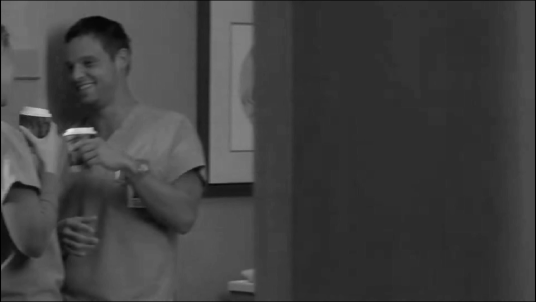
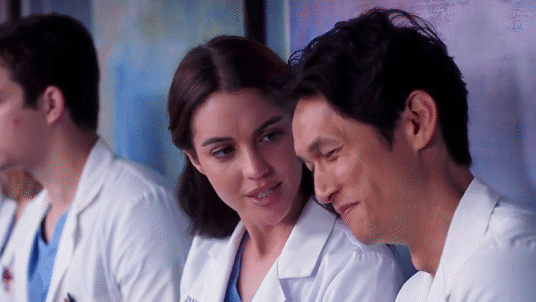
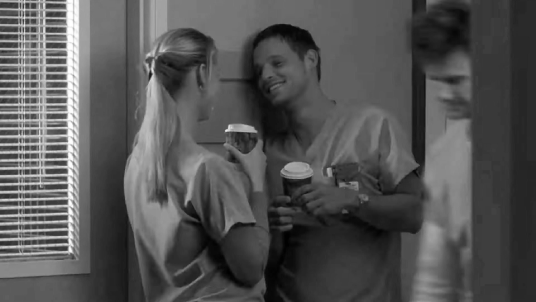

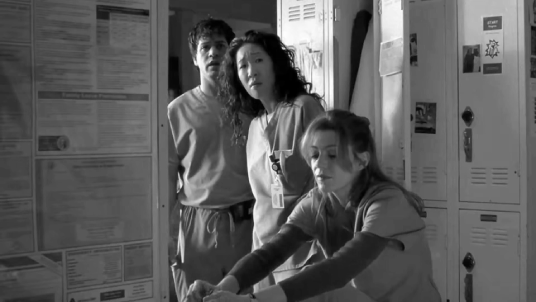
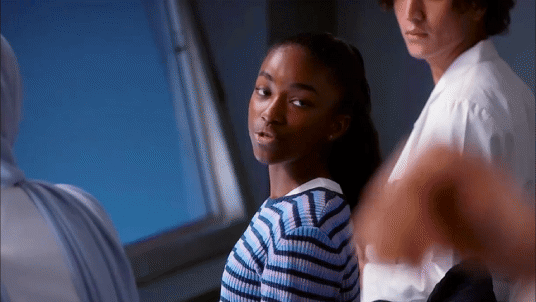
oh nothing just a soft girl and an arrogant guy laughing and being judged <3
GA: 2x10 // 19x07
#greys anatomy#izzie stevens#alex karev#jules millin#benson kwan#blue kwan#greysedit#gaedit#tvedit#izzie x alex#alex x izzie#jules x blue#blue x jules#tv#*#stop finding parallels of them challenge level IMPOSSIBLE
244 notes
·
View notes
Text
Higurashi: Massacre Chapter 3
Takano don't make a creepy face for one panel challenge: Impossible

Seriously, this is the kind of face I would imagine a sadist doctor would make when giving someone an injection.
Satoko has some incurable sickness. Irie said it's a foreign substance and removing it could result in an extreme reaction in Satoko. Irie said the disease is at level three.
Takano, show us the stuffed animal!
The Rorschach inkblots were made public domain in the US in 2009. From what I can find, Japan's copyright laws give works a 70-year copyright after the time of publication. The inkblots were first published in 1921.
The original copyright of Massacre volume 1 in Japan is also 2009 with a translation done in 2012. So if Momoyama wanted to, she probably could have used an actual Rorshach inkblot.

A call from Tokyo, you say? Tell me more Irie.
Rika says the world will end in two weeks. Does she think time stops and rewinds or does she just not care about the world if she dies in it?
For the record, these are parallel timelines. The world continues to exist even when Rika dies.
That 50,000 yen came out of Mion's pockets? I mean, in 1983, that would have come out to a little over 200 USD, but that's still a lot of money for someone Mion's age.
Of all the things that are impossible for Rika to predict, it's whatever Mion has them play during normal club activities. Is Rika saying Mion has the sort of whimsy that makes her impossible to bind to fate?
Hanyu, shut up.

In Atonement, Keiichi realized he caused tragedy by not trusting his friends, and Rena realized she caused tragedy by not reaching out to them for help.
Rika kind of accidentally took the advice they learned here. She told Keiichi what was bothering her and then he helped her. It's not as grand as what happened in Atonement, but Keiichi once again smashed destiny.
Convincing the store owner to let them play a different game is such a small inconsequential thing but it is important this happened.
There were a series of experiments done in the 1960s which would form the basis for the concept of learned helplessness. If a dog was trapped in a room with an electrified floor and prevented from escaping, the dog would eventually give up trying to escape even when the mechanisms preventing them from escaping were removed.
The only way to help them overcome this behavior was to show them that they could actually escape by literally picking them up and showing them that they were fully capable of escaping on their own.
It's such a small thing, but Keiichi showed Rika how to change destiny in a small way. And it's helping her break that stranglehold on her heart.
I kind of wonder if each timeline works in a sort of Schrodinger's cat sort of way. Events in every timeline are equally likely to happen at first, but small actions gradually define what will end up happening.
If Rika hadn't told Keiichi about the games, he would have just followed along with the script that destiny gave him and I'm certain he would have given the doll to Rena again because that's what he's supposed to do.
But Rika telling him what was going to happen brought out the Keiichi from Atonement who declared they would tear every devil script to shreds.

Keiichi finally gave Mion the doll he's wanted to give her since the end of Cotton Drifting.

Keiichi knew what Rika wanted him to do. Even though Rika and Hanyu are the only ones who recall what's happened each arc, it seems the memories and wishes the others have made over all these arcs are reaching back to themselves.
Atonement was where all of Keiichi's wishes to find the truth, to make amends, and not let the world fall to ruin finally burst through. And while he didn't keep his memories, those wishes are still etched in his heart. And I think they only are manifesting in him because Rika is willing to believe destiny can be averted.
And now Rika sees the next two weeks as an opportunity to change her destiny. She's smiling earnestly for once.

Nipa Beam!!


back
4 notes
·
View notes
Text
So I know everyone has already dissected this scene to its core, but it’s taken me a good 48 hours to digest this and I just needed to get it out.
I’m an aspiring actor, I’ve been training for a long time, with a lot of amazing teachers. I’ve watched a lot of shows and shipped a lot of couples. Some of them beautiful and canon, others, well, let’s just say waiting 22 years and counting for acknowledgement, closure, anything, it’s a damn challenge. I’ve seen a hell of a lot of will-they-wont-they’s, baiting, purposeful ignorance, deliberate fake outs, zero explanations, storylines that basically caused canon disintegration, the works.
In saying that, Dean and Cas were right up there on the list with the other “impossibles” because honestly, I didn’t think the writers would have the guts to do it, but I am so f*cking proud they did. It’s safe to say I’ve watched the scene a good hundred+ times already.
I’ve seen a lot of “controversy” around Dean’s reaction/Jensen’s acting choices and whether or not Dean reciprocates Cas’ feelings, and obviously, I needed to add my own views to the mix.
Just work with me for a minute here.
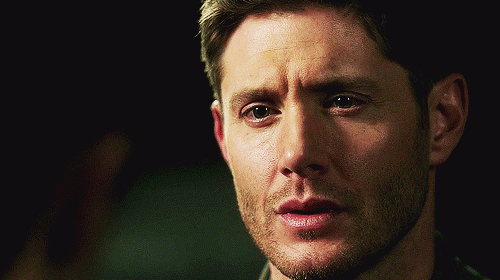
Dean Winchester is an emotionally repressed trainwreck, and ironically enough, the one that is so full of emotion it hurts to watch. When Cas first starts his speech, he’s confused, really confused because why on earth would Cas start off on a rant now? Billie’s waiting to kill them, he just said he knew something that was more powerful than she was, something that could save them. That’s where he thought this speech was going.
The confusion turns to realisation that it’s a goodbye when Cas starts telling him how incredible he is, how his entire essence is love. Go back and watch the scene again, when Cas says “you’re the most caring man on Earth”, you physically see Dean look down, his eyes searching, he’s actively trying to make sense of what’s happening, he knows what’s coming and you can see him coming to terms with the shock of the words being said to him. He then looks directly at Cas. That look, that was pure shock.
Also, notice how he doesn’t stop Cas from talking? He doesn’t interject, make a joke, doesn’t talk about how there is no time for this now, they’ve got to at least try and stop Billie. He. says. nothing. He listens, he listens like I’ve never seen Dean listen before. Because it’s sinking in now.
When Cas really starts crying, when he says “you changed me, Dean”, you can actually see the pain in Dean’s eyes. He’s no longer in control of his emotions, he’s crying too. He’s never seen Cas like this, so raw, and vulnerable and human. This is the hardest, most emotional conversation they’ve both ever had. They are talking about the one thing that everybody knows, but is never addressed. When it wasn’t talked about, they could deny it, live in the lie. Once it’s said aloud, it’s real and they can’t turn back.
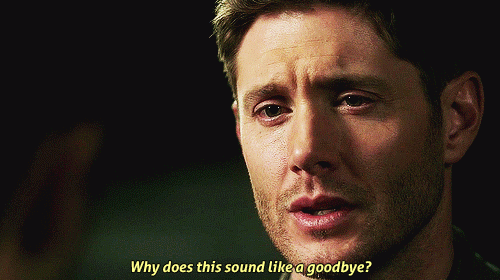
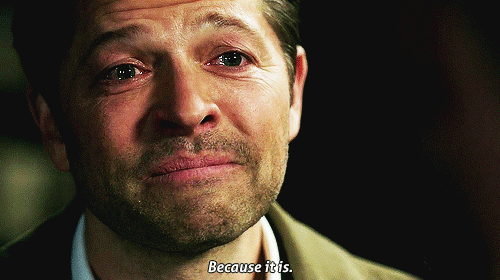
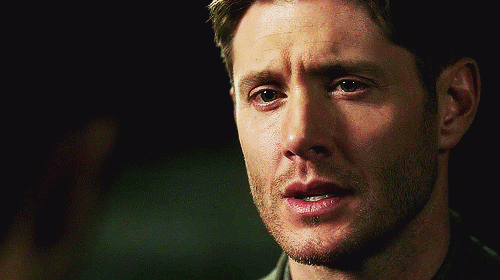
This above series of interactions is the part that kills me the most. The moment Cas says “because it is”, that’s the exact moment of realisation. Look at that last GIF, really look. He’s just worked it out, that he is Cas’ true happiness. He knows what’s coming before Cas even says it. Go back and watch the scene again, they pulled that off so well, the way the music swells at this exact moment. Jensen is giving us everything here, you can see what’s happening in his head - he is Cas’ happiness. He is the one thing on Earth Cas wants and thinks he can’t have. He is the reason Cas is about to die. He knows what Cas is about to say and he’s not sure he’s ready to hear it, not now, not like this. It’s almost a silent plea not to say it, because he knows. Of course he knows. It’s like he can’t quite believe Cas is really, after all this time, finally going to say it.

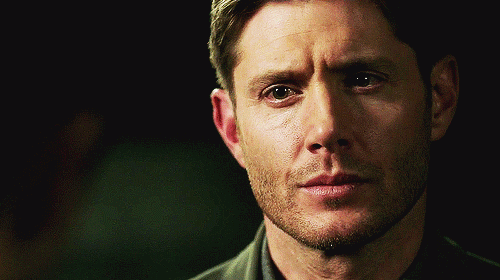
And because obviously Jensen decided that that wasn’t enough to break us, the loaded reaction when Cas says “I love you” has me nothing but convinced that it’s reciprocated. Because Dean knows. He’s always known. Those tears, that head tilt, that gulp. He’s so genuinely confused that they’re really having this conversation. It’s like he can’t quite believe that this is the reality before him because he’s been living in that denial, in that self-loathing and unlovable layer he believes to be true. He’s been under the ‘what if... but it could never be’ umbrella for so long.
What also makes this real is that there isn’t anyone else around this time. When “I love you’s” have been said before, they have always been able to deflect it, with other people or other words. Now it’s just the two of them. No deflecting, no running away. Dean is forced to hear it, to absorb it, to realise it’s for nobody else but him.
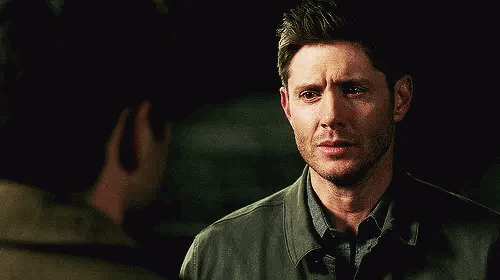
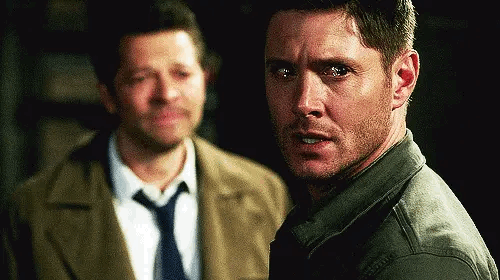
Now, I don’t know if you guys felt this, but when Dean says “Don’t do this, Cas”, he wasn’t just referring to Cas sacrificing himself to the Empty, he’s telling Cas that he can’t just say this, not now, knowing he’s going to die, knowing that Dean won’t get a chance to think, to process, to say what he needs too. I keep staring at that GIF above, Dean is breaking down, I’m almost convinced that Jensen was using an “I love you too, please just stop this” inner monologue for this bit. Look at the way he’s looking at Cas before he realises the Empty has started materialising and turns around. That’s a look of pure heartbreak. Trust me when I tell you, it’s really hard to keep those inner thoughts inside if you’re so in the moment - actually, don’t just take my word for it, read any acting book, ask any actor, it’s so hard to keep that in and sometimes you don’t, and sometimes you do - it’s in both the resistance and the letting go that the gold happens. This my friends, is gold.
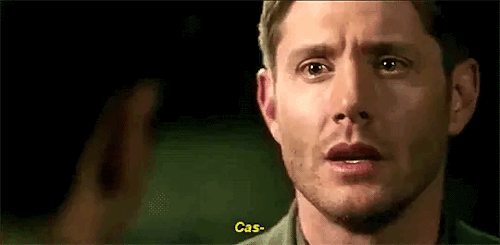
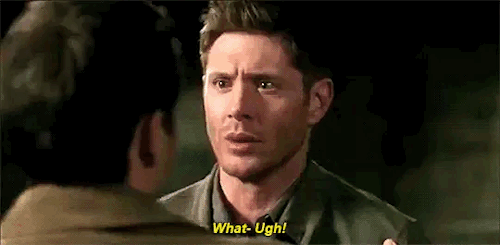
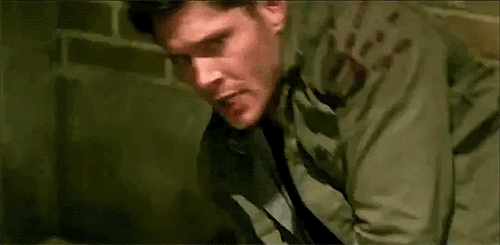
Did anyone else hear “Cas, I-”, well, regardless of whether or not it was an “I” or a very sharp breath, the outcome is the same. Dean’s gone into immediate panic mode. The Empty at one end and Billie at the other, and all poor Dean wants to do is gather his thoughts on not what to say but how to say it. I don’t think he comprehended just how little time he had, he was so focused on what was being said that the reality of the situation caught him completely off guard.
Also, I know this post was about dissecting Dean’s reaction, but can we sidebar a minute to talk about Cas as he pushes Dean out of the way? He’s sobbing, he’s fully crying. That hit me really hard, I’ve never seen Cas cry like that, I’ve never seen Misha get to play that level of emotion before and it was the most heartbreaking thing to watch since The Doctor and Rose and Buffy and Spike, to which by the way, I find many parallels between those couples and this scene.
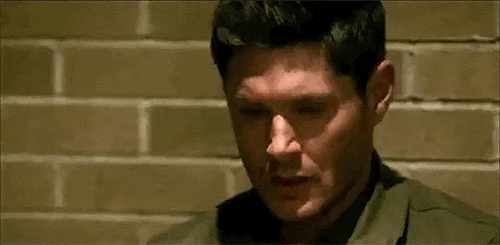
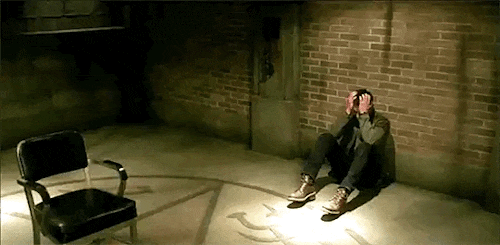
Speaking of crying, that brings me to this: Dean slumped on the floor, ignoring a call from Sam, sobbing his heart out knowing he’s lost everything. Dean-I’m-emotionally-unavailable-Winchester is sobbing. Maybe I’m wrong, but I don’t recall ever seeing Dean cry like this before either, the sobbing was so evident and piercing in that silence. The look around the room, the burying of his head in his hands, that is a classic writers romantic love trope if I’ve ever seen it, they really pulled out all the stops with this one.
So, to summarise, I think Jensen’s choices and Dean’s reactions were absolutely and utterly perfect. They both did it so well that it didn’t break from character that these two emotionally distant and repressed men are in love and finally voicing it. Jensen barely said two words and still managed to cause mass coronary’s across the fandom. That my friends is what you call a brilliant actor. I bow down to the talents of these two amazing human beings.
Before I leave this novel, I have to say there are now a few things I’m going to need from the powers that be to not screw this up, help me manifest this:
1. Dean gets to reciprocate his feelings to Cas in person. So, I’m gonna need Cas back and a very emotional Dean.
2. Dean to be actively dealing with heartbreak in the next episode (unless they decided to bring Cas back that soon, which I wouldn’t put past them at this point).
3. Sam to confront Dean about his feelings for Cas, because out of everyone, he’d be the one to hit Dean with the truth of his fears. Sam knows. Sam is supportive. Sam sees it all.
4. I’m gonna need some physical affection, cause after 12 years of nonsense, we damn well deserve it. A hug, and not just any old reunion hug, a proper, this is different now hug. A kiss because hello, in love out loud now. Forehead touching, handholding, really gonna need the works here.
5. A happy ending for the two of them, one way or another. We’ve never had one, it’s time.
Okay, have at it now, let’s speak these into existence please.
Note: GIFs are not mine, I did not make them, credit to owners who I’m not sure of, but they’re beautiful, thanks for making them. EDIT: I’ve just been informed that these gorgeous gifs belong to @michaeldean and @inacatastrophicmind!
#supernatural#SPN#DeanCas#destiel#deanwinchtser#castiel#15x18#Jensen Ackles#Misha Collins#actor#acting#I ship it#shipper#i love you#spn spoilers#opinion piece#thoughts#my two cents#ships and lattes
6K notes
·
View notes
Note
another character based question - how do you feel about mikasa? a lot of fans dont like her, im curious about how you feel! - armin anon
Hellooooo Armin Anon. OMG it’s been forever since I had the time to sit down and do a proper meta, and I apologize.
First off, I finished the manga!!! (So, spoilers ahead for anyone else reading this.) I had to lie down after reading 139. It’s a tremendous story and I’m still taking it all in. The set pieces and personal/emotional stakes of everything that happens is just astounding. If it’s one thing Isayama does good, it’s the gut-wrenching personal anguish that underlies the action. I’m absolutely floored. My favorite bit was probably the timey-wimey stuff in Paths and Eren. That blew my freaking mind. But onto Mikasa!!
A Cruel Yet Beautiful World
I remember way back when I started the anime that I started liking Mikasa first out of the group. I liked how sullenly silent and no-nonsense she was, and I liked her loyalty to Eren. Her emotion, especially when Eren died in Trost, was palpable and terrifyingly beautiful. Her grief was incredibly realistic–���rushing off with a death wish that even she couldn’t succumb to in the end, because of the drive to fight that she got from Eren. In a world like SNK, her relentlessness breaking through her grief was incredibly moving. And her philosophy is basically the driving theme of SNK: “This is a cruel world, and yet so beautiful.”
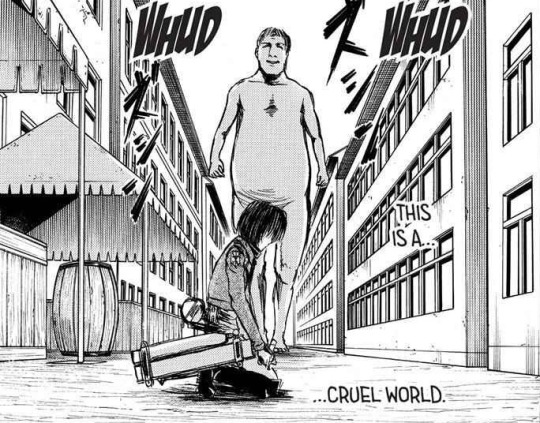
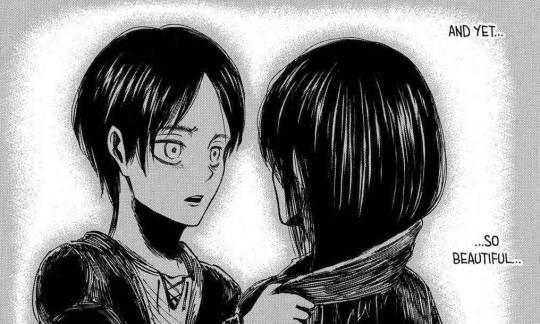
This is the same moral message she gives Eren when he can’t find the strength in him to fight Annie––and gives him that warm, understanding, inscrutable smile that allows him to finally accept his own monsters, fight Annie, and save her and Armin. (One of my favorite panels of her from the manga, actually.) Mikasa is basically the first character we meet who embodies this contradictory morality, which grows to engulf SNK and other characters as well (Levi, Reiner, and Armin especially come to mind). Which could be why I was drawn to her at the start, since the complex moral outlook of SNK was the primary reason I fell hard for this story.
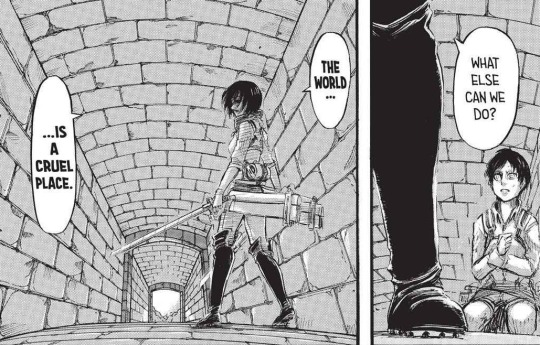

(And gosh, it’s tragic to realize that it’s teaching moments like the scene above that made Eren into the person who could influence his own child self to murder, the person who could wipe out so much of humanity, the person who could take Ymir’s challenge to free her by destroying the love of the person who cared the most about him. I’m still processing yo.)
Acker-parallels
I started really analyzing Mikasa when I had to defend her from a friend of mine who accused her of resenting Levi (for beating up Eren) and that’s why she attacked him so violently in the RTS serumbowl. Because of my research into rebutting that, a lot of my affection for Mikasa now comes in seeing the little ways in which she cares and trusts other people, including Armin, Levi, Gabi, and Jean. And her quiet sensibility that goes beyond her love and protectiveness of Eren.
With Levi in particular, I find a lot I like about her. Because you can definitely see her annoyance at him, but she also trusts him more than anyone else in the Corps outside of Armin. After Levi’s violent encounter with Historia, she was the only one who implicitly trusted Levi’s judgement, backing up Armin’s more reasoned logic. She sees beyond her own emotions and even moral feelings and realizes the world is cruel enough that sometimes people have to do dark things to help others and survive.
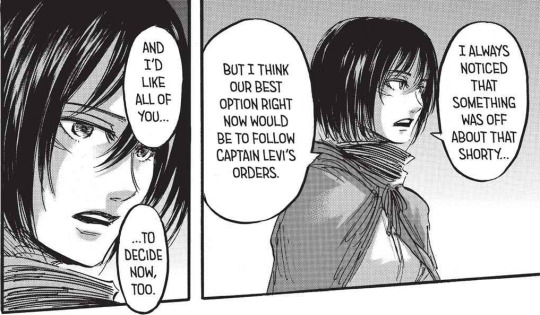
This is very much the same statement Levi made to the 104th when he had asked them to follow Erwin’s orders when the commander’s plans were questionable on the surface: “Do you trust him? Those dumb enough to say yes… come with me.” These two understand each other on a moral level, and they ask for their comrades’ loyalty without demanding it, because they each know that everyone’s conscience is their own.
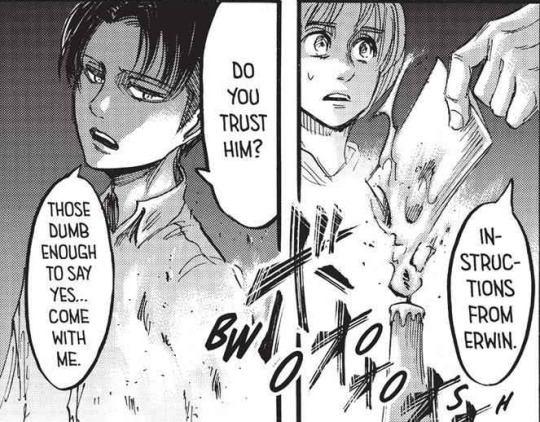
There’s a clear parallel between Mikasa and Levi, not only because of their Ackerman heritage and sensibilities (loyal to a fault to their chosen person, impossibly strong, quiet and grim), but their frustration when they cannot protect the people they are responsible for. They both know they are the strongest around, and if they cannot fulfill on that power, a lot of people will die.
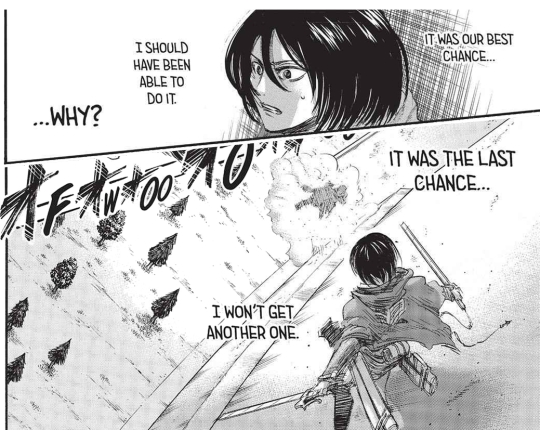
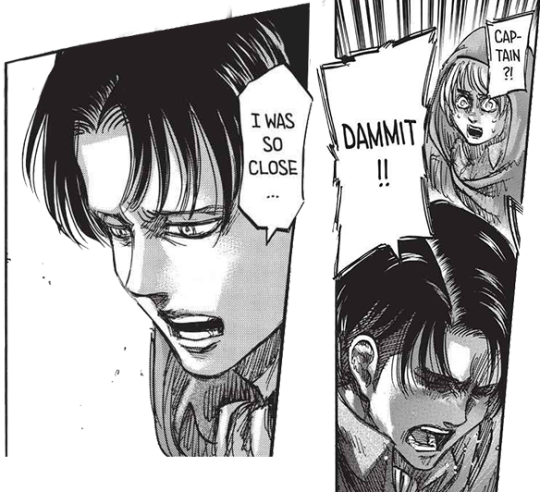
There are many moments in which Mikasa puts aside her personal feelings to do her soldierly duty, from leaving Eren to help with the evacuation of Trost to leaving Eren and Armin to fight the Colossal Titan alone in Shigonshina.
And then there’s the fact that Levi’s the one who could break past Mikasa’s headspace and distraction so that she can do the right thing. He understands her strong emotion, he respects it, but he also knows when that has to be put aside for the greater good. But he doesn’t put her down for having those emotions, either.

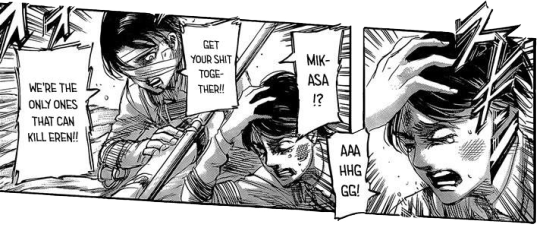
Strength from Eren, Humanity from Armin
Mikasa’s love and loyalty to Eren challenges her tremendously after the timeskip and her sorrow at Eren’s change is what really stands out to me about her character in the Marley arc. The absolute grief in her eyes when she tells Eren what he’s done is devastating, and it shows just how much goodness and compassion she does have.
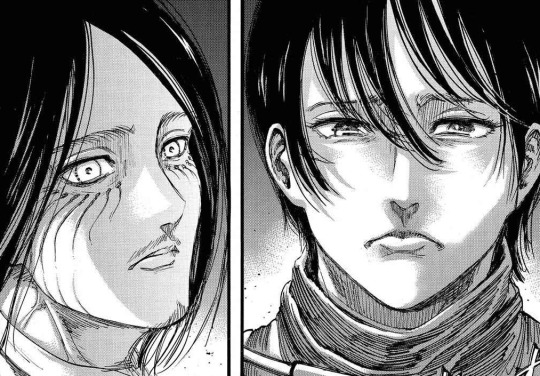
And yet she longs to understand Eren, to trust him, to believe there can be something redeeming, and not merely jaded and tired, in what he taught her so many years ago––to fight, to win, to live.
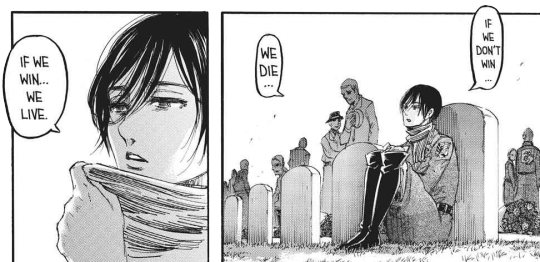
There’s such a difference between these same words said here by Mikasa, so many years later, after so much heartbreak, to the anger and flame that were in them when she first heard them, back when she realized that this was the way of the world. That death and killing happens in the natural world everyday and that’s how you survive. That the world is both cruel and beautiful.
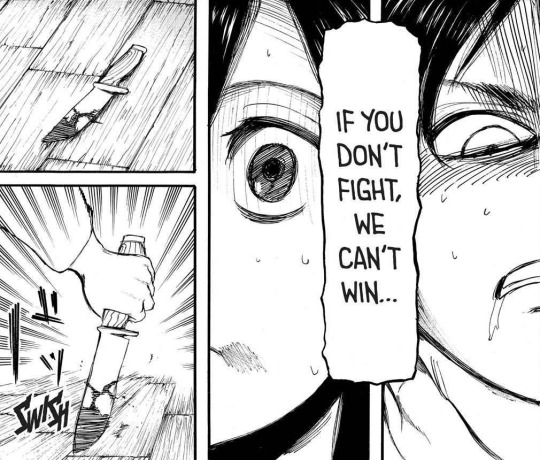
And yet as the years wore on, as Mikasa grew closer to others, found purpose in protecting others, sought a life with Eren… as she wandered further into the forest of life and society and relationships, she lost some of that simple injunction... to live is to fight, to fight is to win. She, like so many of the 104th and the others on this journey, found that it’s not enough to just fight and live and be satisfied. We really want it all to mean something, to have our actions be redemptive. To allow ourselves to believe that we do what we’re doing because we’re not just saving ourselves, but saving others, “saving the world” like Yelena points out (in the forest therapy session pfff). And it’s that drive for something bigger in our actions that grieves her so much with Eren, because as she wants her own actions to be fundamentally good and selfless, she wants his actions to be moral as well.
So while Eren is the person that frustrates Mikasa and motivates her to become stronger and braver than she ever was, Armin is the person who humanizes Mikasa and allows her the space to be gentle and vulnerable. She comforts Armin, confides in him, puts her faith in him, and puts her life in his hands.
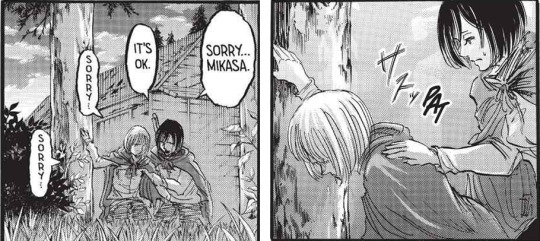
She trusts Armin with Eren, and she values Armin’s intellect and compassion, qualities she doesn’t have in nearly as much quantities as he does: “There are only so many lives I can value. And… I decided who those people were six years ago. So... you shouldn’t try to ask for my pity. Because right now, I don’t have time to spare or room in my heart.”

This bit from her confrontation with Ymir and Historia was a defining moment for me with Mikasa. It’s honest and realistic in a way that few of us care to admit about ourselves, and it’s just super chilling and badass coming from her, too. It also shows how much she fights for Armin and Eren both. They are the two people she loves the most in the world, and she never gave up on saving either of them––from death or from themselves.
I’m looking back on Trost now and finding so much irony with the ending to SNK. In Trost, she was the one to give up on Eren, telling Armin that it was hopeless to try to extract Eren’s personality from his Titan form. And yet, like in the end, it’s always been between Armin and Mikasa to try to salvage Eren’s humanity. In Trost, Armin tells Mikasa to leave––to go do what she’s good at (saving lives)––and to entrust Eren to him.
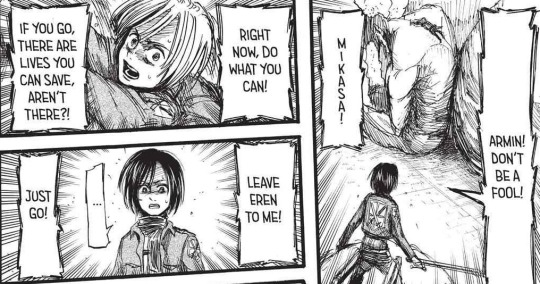
It’s a huge expression of both Mikasa’s trust in Armin, and her belief in Armin’s abilities and friendship for Eren. And in the end, it’s the two of them again debating on if there’s any humanity left in Eren. The bond they share is intimate and deep. With all the military doubting Eren and scheming to take away his Titan (with even Jean and Connie unavailable to them emotionally), it’s only Armin and Mikasa against the world––the only two people who can truly consider Eren’s actions and hold off on judging him. And you can feel their love for him even as they doubt him.
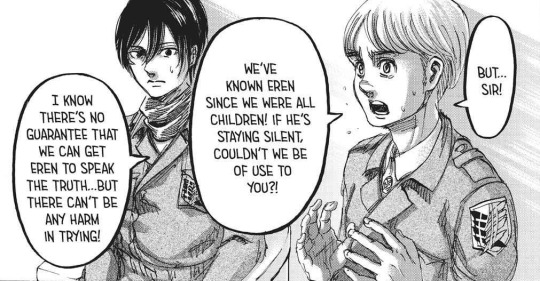
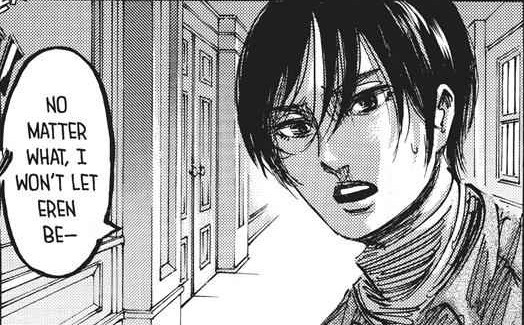
And like back then, it has always been Armin who understands Eren most, the one who recognizes his own evil and Eren’s and finds a redemption in having others stop you, because you cannot stop yourself.
And that’s the thing I really take away from SNK and from Mikasa’s journey, that we all have devils inside us, and yet there is still beauty to be found, within us and in the world––from the natural wonders that Armin dreams of, to the comfort of purpose and companionship that Mikasa has in Eren. Love and wonder is what redeems us of our devils. And yet love itself is complicated, and can turn ugly in its obsession. That giving up that love is what makes the love selfless and beautiful, what absolves us of the selfishness within us. That’s what Mikasa learned. And in the end, she was able to release that love for the good of the world.
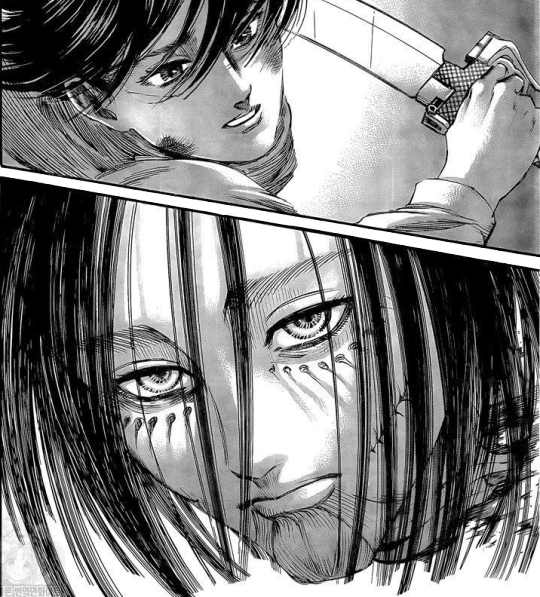
So I guess to sum up, I really love Mikasa. I can see why her dogged loyalty to Eren might annoy some fans, but I think there’s a lot more to her than simply that, and in fact, her journey and growth is heart-rending and one of the most symbolic arcs of SNK and fundamental to its entire theme. She’s a badass with a lot of emotion and depth behind her cold mask.
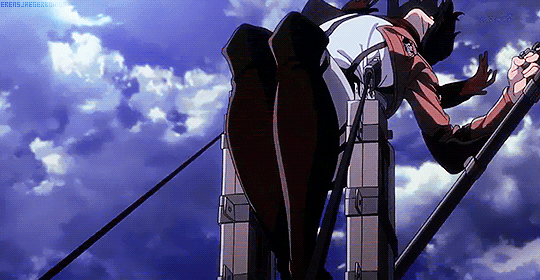
#eremika#mikasa ackerman#eren yeager#armin arlert#levi ackerman#aot meta#snk meta#shingeki no kyojin#attack on titan#snk#aot#attack on titan meta#attack on titan analysis#snk analysis#mikasa ackerman analysis#mikasa ackerman meta#shigonshina trio#ask#armin anon#*mymeta#*mythoughts#*mine#long post
241 notes
·
View notes
Note
have you ever talked abt held’s story in skyrim? he’s so cool, i would love to hear about him. what quest lines he does and what characters he’s close with?
lol oh uhm I tried to make this short but its kind of still a whole page and skims everything only at a very surface level.
So his story in Skyrim is very basic. Most of his lore is stacked upon the fact that he and my HoK are like parallel characters? Like both went through hell in their early childhood and teens but while my HoK had no support network at the end, Held did and that's why their stories end very differently.
Why Skyrim?
In general Held comes to Skyrim as a member of the Cyrodiil Thieves Guild because he heard the one in Skyrim is struggling and he likes a challenge. The game intro happens and Held is in denial over being Dragonborn and throws himself into work instead.
Start
The first half of the TG questline happens but during that he and Mercer have a thing (very much unlabeled and weird bc Held insists he's not a part of the guild and talks back to Mercer all the time and it sets sth off in that man). Held figures its Mercer behind everything and not Karliah but he keeps it to himself because he doesn't really have a personal stake in the whole guild drama. Meanwhile Mercer figures out Held is the Dragonborn and gets weirdly jealous over being a world changing person but realizes his chances of getting rid of Held is probably near to impossible because of it all.
Interlude
Held goes on a detour to Solstheim for a bit (so basically just doing some random quests there) because he used to live there for a while and hits up his old acquaintance Teldryn. They spelunk together for a bit before Teldryn tells Held to face his problems and get his shit together. So the TG quest continues and Held begins to play with the thought of following the call of the Greybeards for the first time.
End of TG
Mercer and Held start noticing the tension between them and Mercer confronts Held about being the DB and accuses him of being a coward and idiot. Held asks if Mercer is behind all the TG drama. Mercer gives no answer and they go to find Karliah. Mercer stabs Held in an attempt to kill him (and Held kind of immediately forgives him for it bc childhood trauma). Karliah sees sth is going on between the two and tries and fails to get Held really angry and riled up about it but he still offers to help. Secretly he hopes to talk Mercer into running away (Held has killed people before and stolen a lot of stuff so he feels like a hypocrite condemning Mercer all that much).
Brynjolf kinda feels bad for Held but they all go after Mercer like in the mq. Final fight between Mercer and Held ensues and Mercer lets himself get stabbed by Held, while dying he tells Held to face the music and to stop being such an idealistic hypocrite, thinking at the same time that was the part he liked about Held the most. Freaked out over having killed the man he (kind of) loved, Held runs and doesn’t return to Riften for a long time.
MQ
After that the MQ happens. Held tries to stay out of the CW because he can’t work with the Empire anyways (He’s considered a terrorist by the Dominion bc of past happenings) and he doesn’t like the stormcloaks either so he just pretends to not see it ( Is that a good solution? Probably not but facing issues is sth he dislikes so he just runs usually).
After the MQ he settles down in Solstheim and often visits the Skal to get some alone time. At this point he also runs an information network and helps people escape the Dominion.
His besties are probably Irileth, Erandur, Teldryn, Jarl Balgruuf (they are around the same age (technically not bc elf) and like to drink and eat good food), a lot of my other ocs I never talk about (LOL), Delvin and Tonillia. Surprisingly he and Karliah get along really well. Lowkey had a falling out with Brynjolf bc of the Mercer thing. He admires Mjoll for her tight grasp on her morals. At the end Freya and him kinda have a teacher student dynamic. He also has a weird connection to most of the Daedric princes, especially Sanguine seems interested in him.
13 notes
·
View notes
Text
im getting a little too in my family feels today and so INSTEAD of feeling those im just going to ramble for a second about why i fucking love paladin!aelwyn because. im. just like this i guess im coping leave me alone
cw for discussions of child abuse, maladaptive coping, drugs and alcohol, self harm, destructive tendencies, basically everything we see in canon and the implications
aelwyn is ... SO interesting to me because for as much of her interiority as we see, as much of her as we think we understand, as much as i could ramble about her character for hours, we know ALMOST NOTHING about her in actuality?? (besides ... one key thing)
(this is like 2k and probably incoherent someone please stop me)
okay. listen. almost everything we see aelwyn do in s1 is maladaptive rebellion against her parents and home life. the drinking, the drugs, the partying, perhaps some of kalvaxus (though i dont think we fully understand how much of that was forced on her as well, kalina WAS watching her when she was talking to adaine about it). you can say like, oh aelwyn is a party animal, she's impulsive, she makes risky decisions, she's bitchy and rude, and its like. okay but IS SHE ACTUALLY. because under her parents thumb she had an EXTREMELY limited amount of freedom, and usually when people are suffering from very little control over their life, they WILL act destructively over the tiny bit they can, either harming themselves or their environment or people lower than them in the pecking order, because in a way, that feels like a reclamation of autonomy. saying "you have so much power over me but can you stop me from hurting myself and destroying what you havent managed to claim yet?". its just like, kind of what human brains do and frequently has little to do with a persons actual personality or impulses, its just. desperate brains trying to control SOMETHING because autonomy is a fundamental human need and when thats taken away we get. very bad off. (this is one big reason eating disorders are SO common with abused kids.) so i think a lot of the s1 aelwyn we see is like. this is a very desperate, abused teenager "acting out" in the only way it is possibly somewhat safe for her to do so because, on a psychological level, the self destruction is weirdly the only emotional tether and its either this or just dissociate all the time (something we do see she has problems with in canon)
and yes, she did treat adaine horribly in s1. she fully did. obviously what we get in canon is what happens but a moment thats interesting to me is in episode 1 where adaine has attacked aelwyn several times, who either does nothing or just bounces it back, when she says "i never cast spells at you" and siobhan immediately retcons it and says "yes you do, all the time" (i havent gone back and watched this bit so i might be wording this wrong). obviously its an improv show and the canon is built between performers as they go, but that was interesting to me. that brennan hadnt intended for her to have fought back in that way. she definitely feeds into the emotional abuse from their parents and participates in all the toxicity there, but we know in canon that she did that because of overwhelming fear and self preservation. and that her self hatred because of it just fed back into the cycle and made her feel like she wasnt good enough to even try to break free from it. this is very common in golden child/scapegoat sibling relationships where the golden child SEES what the parents are capable of and becomes a participant in the abuse out of fear for their own standing. in any way siding with the scapegoat child not only directs abuse at themselves as well, but frequently makes things WORSE for the scapegoat because the parents will take out the challenge to their power on them even more. so, if aelwyn DID ever try to defend or help adaine when they were small, she would have VERY QUICKLY learned that made things worse for everyone. and just. sectioned that part of her brain off, as she's done with so many other things. (and i dont think im reading too much into the forest scene with the abernants to say their parents were VERY QUICK to turn abuse towards aelwyn if she stepped out of line even a little. like, you dont flinch when a hand moves unless. you know. dont need to say it just something to think about. as far as we saw in canon, she had done everything they asked of her leading up to the forest, and we DONT KNOW what happened in it but we do know brennan specifically called out how in broken spirits she was when adaine was summoned, even though they did the ritual to avoid all of the nightmare bullshit)
(the house party is literally a whole separate post but i think its fair to point out that 1) she was super under the influence when that was happening which DEFINITELY is in no way an excuse for her behavior but worth remembering when trying to analyze that 2) her losing that fight did canonically have DRASTIC consequences for her and even if she didnt know exactly how that was going to turn out, i think she knew how bad it might be. and she did not know adaine or any of the bad kids were going to be there in the first place)
all that said, it feels in some ways counterproductive to say that aelwyn is an extremely devoted and protective person (yes we're getting to the paladin shit i know i've been rambling a while) but i think that thats strangely ALL WE ACTUALLY KNOW ABOUT HER. because we've established that her self-destructive and abusive behavior in s1 is almost entirely psychologically scripted for her by her parents, we dont know how much of her villain shit in s1 was LITERALLY UNDER THREAT OF DEATH because we know at least killing the oracle was and we dont know how much of the rest of it was mandated by either her parents or kalina other than that she probably was under orders not to tell adaine the truth, and we know participating in all of this caused extreme self loathing in her that she refused to show to anybody and was too terrified to act on in any way
so, like. what does that actually leave us?
here's what we do know about aelwyn:
- of all the schools of magic, she went into abjuration
- the entire bbeg plan from season 1 hinged on aelwyn's complete faith that her level 1 sister was the most prodigious diviner in the world
- right after (?) the house party, she locked her memories where only adaine could find it with a note basically saying "theres so much bad blood between us but i know only you could find this"
- she desperately wanted to protect adaine and the fact that she was too afraid to do so made her hate herself (and her knowing that adaine now knows this is the turning point in their relationship)
- despite everything, even in the nmk forest, she still loved her parents
- the SECOND she is shown genuine love and affection and care from adaine, and adaine says whatever you do, i am here with you, all her actions from there forward are just about protecting adaine from their father, very nearly at the cost of her own life
- with what she probably thought were her last words (and would have been if adaine hadnt given her the tincture), all she wanted to communicate was how to help adaine and the bad kids, and how despite everything she had always believed in her
- at five levels of exhaustion, unconscious, she used her first spell slot after nine months of torture to build a shield around adaine
NOW we get to paladin!aelwyn. because, once everything is stripped away, the abuse and the control and the maladaption and the threats and the torture, EVERYTHING we ACTUALLY can glean about aelwyn's personality and inner core is that she's protective and devoted. and of course classes arent locked by personality, but that just screams paladin to me. its her WHOLE THING. adaine even says "wizards dont have heals, we dont care about other people" and of COURSE that isnt true for either of them, but? mechanically? aelwyn chose the wizard school that DID let her protect, and DID let her help, but i dont think, at this point, going forward, thats really going to be enough for her (and we could also talk about the parallels between them, how often adaine uses her portents to help other people)
i think a lot of the different reads on aelwyn come from this fundamental disconnect between her actions and displayed personality vs who she actually is and what she actually wants. and i think there are very different interpretations of what thats going to look like for her going forward. but i think, for a girl who's most hated characteristic about herself was her self preservation at the detriment of others, her perceived selfishness, and her fear ... isn't choosing to be braver and more selfless and more protective and shedding that self-preserving instinct for the betterment of others ... and MECHANICALLY being able to act on all those things ... the logical next step? i think its going to be a LONG TIME before aelwyn can love herself, but what other way is there to try? if adaine loves her, and adaine believes she can be better, isnt being better because she trusts adaine kind of a form of self love? saying, i dont believe in myself, but i believe in the person who believes in me, and maybe, in a roundabout way, thats the same thing. she was never able to TRY to be better before, because trying to improve even a little, even when people arent watching, when a harmful force has so much power over you and your actions ... like, the mental dissonance is honestly TOO much to even try, thats WAY more terrifying than letting yourself be bad, to the point where thats psychologically impossible for a lot of people. but now she actually has space and freedom and CHOICE and she CAN embrace the instincts she always had to shove down, she CAN be the person she knows her sister needed her to be
i dont know, i think theres an inherent love letter to yourself in wanting to be better and wanting to improve, even if you justify it by saying its for someone else. and now aelwyn actually CAN improve, and thats probably going to be extremely awkward and scary and there will be set backs and backslides for sure. but. i dont know. i think she wants to make up for lost time. because she never wanted the time to be lost in the first place. and if a protector is who she always wanted to be, whats stopping her from being that now?
#fantasy high#dimension 20#aelwyn abernant#WHO LET ME WRITE ALL THIS#does this even. fucking. make sense. who knows.#THE BRAINROT THE BRAINROT THE BRAINROT
40 notes
·
View notes
Text
Supernatural Rewatch Ramblings: Dead in the Water
This episode is the first one to be directed by Kim Manners. It was written by Raelle Tucker and Sera Gamble. It is still the MoTW format and once again the ‘monster’ is something that was created by human action. Ordinary seeming stories—of bullying, lies, cover up—with deadly consequences.
Read below the cut for more and also watch out for the add-ons by my partner in crime @soulmates-for-real who does the most amazing gifsets and image galleries 😎
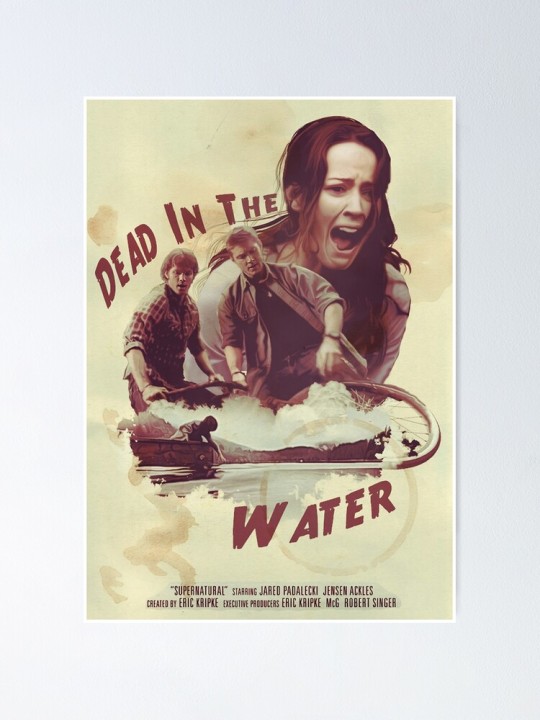
It reminded me of this quote:
“If only it were all so simple! If only there were evil people somewhere insidiously committing evil deeds, and it were necessary only to separate them from the rest of us and destroy them. But the line dividing good and evil cuts through the heart of every human being. And who is willing to destroy a piece of his own heart?” Aleksandr Solzhenitsyn, The Gulag Archipelago 1918–1956
It is a chilling experience—both the actual monster when we do finally see it and the backstory of what really happened. These monsters are all created by the flawed human beings. Here is another quote from the same source which could well be the underlying bedrock of the two very different approaches we see Sam and Dean take in later episodes to the whole saving people hunting things.
“Since then I have come to understand the truth of all the religions of the world: They struggle with the evil inside a human being (inside every human being). It is impossible to expel evil from the world in its entirety, but it is possible to constrict it within each person.” .
Philosophical overtones aside, we are also getting more glimpses into the heads and hearts of the two leads.
It is already obvious that Dean has put the whole ‘Dad- is- missing- and- hasn’t- been-home-in -a -few-days stuff’ on the back burner till …ummm forever ? cos he has Sammy in front of his eyes who is sitting shotgun and being completely brotherly and sniping and bitching while also being boyfriend- level possessive.
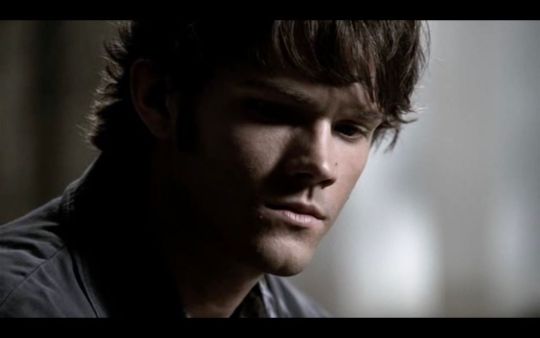
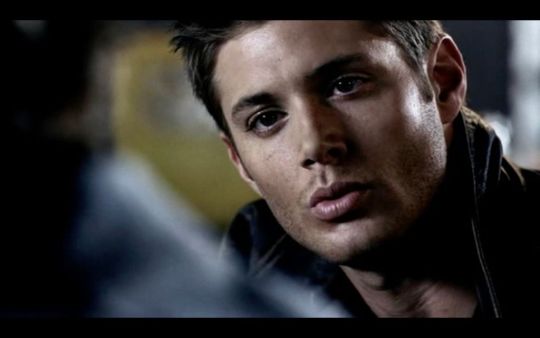
As I said in the earlier review- I was just so swept away by the swashbuckling swagger of Dean that so obviously was an armour for his vulnerability that I almost didn’t notice Sam much. This is the episode where he became something more for me. Someone who was also finding out what Dean was all about at the same time as we were.
Someone who could pull him down to earth with a sharp: ‘People don’t just disappear, Dean. Other people just stop looking for them.’
But also reach out to him and remind him that they ‘can’t save everyone’.
In an early scene in the episode Sam scolds Dean for even starting to flirt with the waitress.
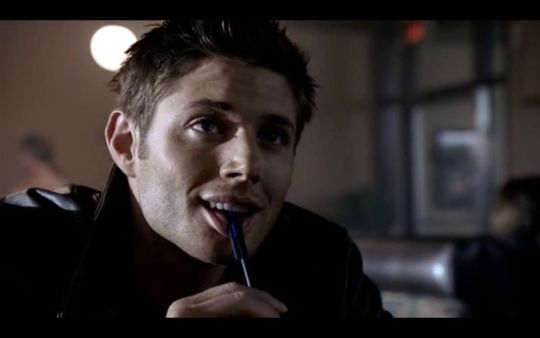
He smirks when Andrea shoots Dean down. He mocks Dean’s pick- up line about kids are the best. He seems pleased in a very petty way that Dean’s attempt has failed and that he has no choice now but to hang out with Sam and to give him his full attention.
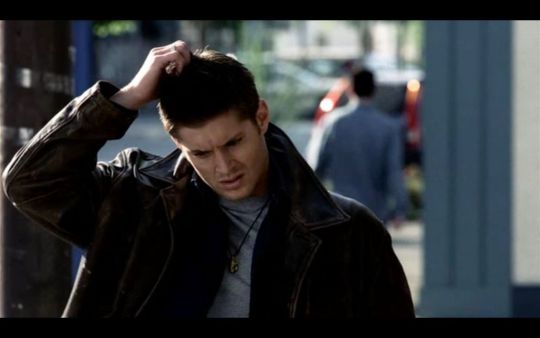
The episode does have plot holes –that house Lucas draws and the history of the friendship of the two men and the missing boy surely must be well known to everyone in that small town, including Lucas’s mother and how come no one joins the dots etc. etc.
But small quibbles aside, we get to see that the past casts long shadows—whether sins of the past or just events of the past. ( again a parallel to the lives of the Winchesters themselves. And in later seasons we find out just how far back into the past those shadows reach!)
We see that Dean connects with the mute boy, Lucas, but then we learn that he can do this because he had also shut down after he saw his mother die and he knows how scary the world can seem and how he needed to make himself brave to carry on.
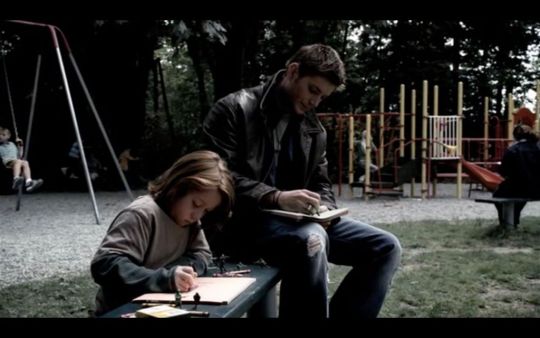
Sam watches from the sidelines and we can see him have an ‘oh ok’ moment as he stores away this information because it has clearly never been discussed in the family earlier. Kudos to Jared for being amazing with the ‘active listening’ that Sheila O’Malley references so often.
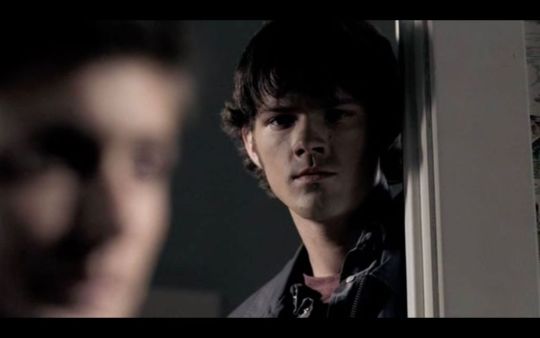
So despite Sam challenging him to name 3 kids he even knows, we see that Dean actually focusses on the kid throughout. The shared sense of loss aside, maybe Dean also sees himself as the protector of all little kids especially after the Shtriga incident. (which we don’t know anything about yet) (and we do see him bond with kids in every episode that involves kids. It is adorable !!)
In this episode Dean is almost drowning in his dad’s leather jacket and the way the silver ring looks on his hand is just ridiculously sexy…sigh….and that amulet right where it belongs…..deeper sigh. Then the cocky grin, the unsubtle flirting, all macho/manly/me- so- hetero/me- see- me- conquer on the outside but the soft squidgy child- whispering caramel centre, the trauma of being a motherless kid—having become motherless in a brutal way, a missing and probably almost cruel dad, a brother he raised as his own who walked out on him to go seek his own dreams….all these layers are being put together slowly for us.
Dean is not what he seemed to be and that brash swashbuckling exterior hides a very complex and interesting person. The script and direction were excellent of course but Jensen brought to it just the perfect balance of bad-boy + I wuv hugs.
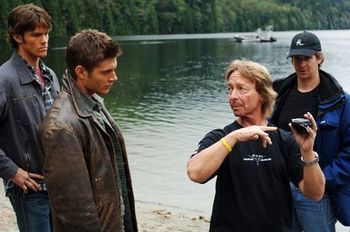
Sam is still finding his way into the story and we are still watching things from Dean’s perspective as narrator which is fascinating to realize during the re-watch. As I have mentioned earlier, I was so swept away by Dean that it took me a very long time to focus on Sam as a separate person.
Ok, now, all together shout--- --WHY do people DO the following things??!!!
Put hands elbow deep into a sink, give lifts to obvious deranged malevolent spirits in human form, ‘let’s split up so we can cover more ground’, go into a shower/bath in a scary scene—can’t they HEAR the dun-dun-dun music score in the background?!! Sheesh.
Anyway. *eyeroll*
In a not- at- all- very- surprising turn of events Sam and Dean’s fake identity is called out and they are asked to leave town, which they do. But ….of course Dean does a very dramatic turn on the highway and takes them back to make sure the kid is ok!
Then Sam rescues the mother from the lethal bath- tub while Dean makes sure the kid is safe. Then they start to connect even more dots and eventually we see an incredible heroic rescue scene in the scary lake with Dean and the boy.
Jensen had described this shot in some interview as the most terrifying scene he had ever done apparently because he was responsible not only for doing the scene right but also for the young boy’s safety underwater.
What a fabulous visual we do get finally, with the boy in his embrace as they shoot out of the water!
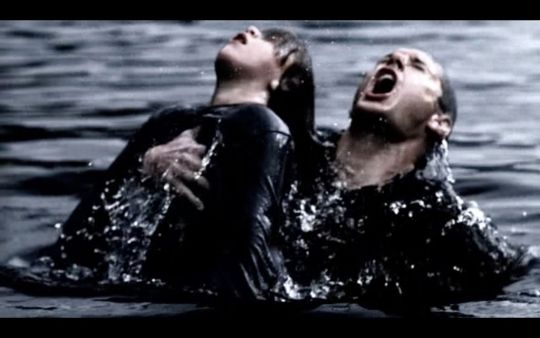
That lake with its dark water is one super creepy place. That very first scene where we see the girl swimming from an underwater perspective had me yelling at the screen for her to GET OUT NOW.
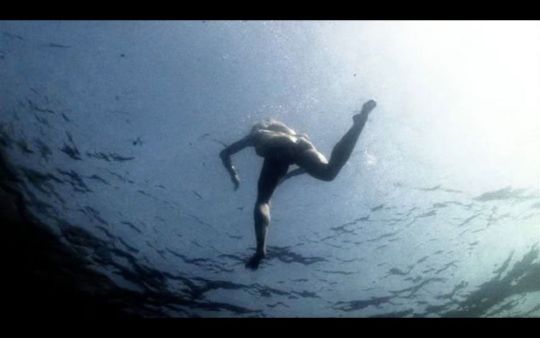
So, finally, all is sorted and revenge has been had and bad folks die, good folks live and as they leave the town of course Lucas chats with Dean and they high five and just like the sister in the Wendigo episode, the young mother in this one also gives Dean a kiss on his cheek. Dean of course blushes and goes all gruff and drives off with Sam smirking in the shotgun seat.
The pattern is beginning to be established.
I am loving it!😍
.
The gag reel of this episode shows Jensen leaping into Jared’s arms.
This is the third episode only. So they have known each other only for a couple of months at this point?! Hmm…my J2 tinhat is also shining. And also wow. I mean Jensen is NOT a tiny guy.
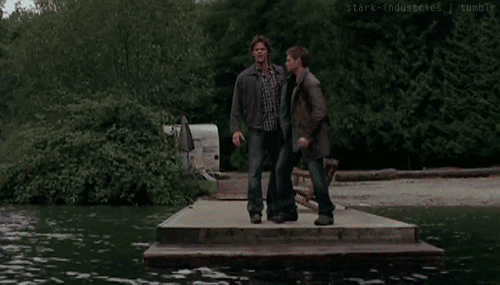
Here are some other possibly more erudite and informed reviews if you would like to go down that rabbit hole like I did.
This one is cool https://the-orbit.net/entequilaesverdad/2016/05/10/supernatural-s1-e3-dead-water-summary/ and gives a fun and interesting score at the end which goes like this
Episode 3 counts:
Woman in the Fridge: 1
For Sophie Carlton being the first to get murdered by the vengeful spirit. It’s obviously meant to hook us harder: I mean, nobody would care as much about obnoxious brother Will, right?
Revenge from Beyond the Grave: 4
Sophie Carlton, Will Carlton, Bill Carlton, and Jake Devins.
Brotherly Love: 2
I had to give one to Sam for cock-blocking his brother right at the start. Another point goes to Dean’s sick-of-your-attitude lecture to his little brother, throwing Sam’s decision to go to college while Dean stayed behind with their dad in his face.
Toxic Masculinity: 1
For Dean downplaying his grief when Sam draws him out about the aftermath of their mother’s death.
Swimming in Sexism: 2
For Will Carlton’s comment to his sister that “guys don’t like buff girls.” I added a point for all the times they had Dean hitting on any available woman. They do want us to be extra-very sure he’s hetero, don’t they?
Cumulative Counts: Dean’s Man Tears: 3
One point awarded for all Dean’s choking up about Mom. We’re now three for three, folks.
.
This review totally calls out Dean LOL. I love the reviews that were written as first watch because they are without the benefit of hindsight we have on a re-watch.
.
http://markwatches.net/reviews/2013/11/mark-watches-supernatural-s01e03-dead-in-the-water/
“It was fascinating to me, then, that through this, Sam was able to learn about Dean’s own emotional reasoning behind his hunting. Of course, Dean, being the most stereotypical dude of all dudes who ever duded, has to immediately act like feelings aren’t cool because BLEH. Okay, that is one aspect of Dean that I’m not terribly interested in, especially since he expresses feelings like every five seconds. The whole “I am a straight man and I’m very straight and look at that butt straight I’m straight” thing is already exhausting because I get it. You don’t need to tell me this every five seconds.”
The comments to this review are also super entertaining with gems like this:
“So, if you knew that someone had drowned in the lake recently and their body was never found, WHY WOULD YOU STILL GO SWIMMING IN THE LAKE? Especially if two people had. It wouldn't make you think, "Hey, maybe there's something dangerous in that lake?" This show has some of the least genre savvy people EVER. Like, for example, once this mysterious death thing shows up in a sink, why would anyone want to take a bath or really ever fill any basin with water again? Seriously, is this the Bad Decision Olympics?”
.
Here is an awesome review from Fangasm also
https://fangasmthebook.com/2021/01/13/looking-back-on-dead-in-the-water-classic-supernatural/
18 notes
·
View notes
Text
EVANESCENCE's AMY LEE On 'The Bitter Truth' 'I Want People To Come Away From This Album Feeling Hope And Empowerment And Strength'
EVANESCENCE will release a new album, "The Bitter Truth", on March 26 via BMG. The band's first collection of original music in ten years can be pre-ordered as a digital version, CD, vinyl and a limited-edition deluxe fan box set featuring a bonus CD, journal, poster and special cassette of exclusive audio from the making of "The Bitter Truth". Every pre-order will automatically come with downloads of already-released songs "Wasted On You", "The Game Is Over", "Use My Voice" and "Yeah Right".
In the official biography accompanying press copies of the new album, EVANESCENCE singer Amy Lee stated: "When we first set out to make our new album, 'The Bitter Truth', we had no idea of the pain and hardship that the world would soon face. While the planet suffered through the tragedies of COVID, racial injustice and economic upheaval, my band and I were dealing with the aftermath of our own losses, the unexpected passing of my brother, the sudden loss of a child by Tim's [McCord, bass] family, and the virtual loss of our guitarist, Jen [Majura], who has been literally stuck in Germany, unable to travel to record with us in person in the studio.
"Somehow through all these challenges, a theme began to emerge for us as a band. Pushing through is better than giving up.
"After touring extensively on our orchestral album 'Synthesis', we knew we wanted to make new music. In between shows throughout 2019, we set aside time to create together. A few days at my house, a week in the woods, just making use of our time together and getting excited about the seeds that were starting to grow. By the end of that year, we had the foundations of several new songs and the beginnings of many more. After recording four songs with our old friend and producer Nick Raskulinecz in his Nashville studio early last year, we knew we wanted to make the entire thing together. The energy and creativity was electric. Then, all of a sudden, COVID stopped everything. The pandemic turned the world upside down, forcing the album to be done sporadically, and at times separately, throughout 2020. We had to think creatively about how to do pretty much everything from that point on. Almost like it was the first time. There was never question, though, of not continuing.
"We had something special in that room when we recorded those first four songs and they carried us through last year. It was a big leap of faith to just go for it with the album and not wait or hold back or have any certainty about when we'd be together again, but we just knew we wanted to release our music and connect with our fans. We needed that connection, perhaps even more than our fans needed us. We wanted to be something in the world that wasn't a disappointment amid so much other bad news. We wanted to be part of the proof that life would go on.
"I never want us to repeat ourselves and I like to allow total freedom in the creative process, so we started experimenting with whatever felt good, taking it at times to a new level entirely, just everything coming from a real, honest place out of the love of music — nothing off limits. But all those rock shows we had been playing over the past few years really strengthened the roots of the band, and that sound and energy was cathartic. I'm who I've always been. Once again faced with darkness, I'm writing to heal. So here we are, naturally, making a brand new fiery chapter of the story we all love. This beautiful truth has been reconfirmed for me — it wasn't just a phase the first time around, and I wasn't wasting my time. These sounds come out of my heart when I'm being honest and I'm making music that feels like a reflection of myself. I'm proud and grateful to still have my band after all we've been through and all I've been through. As much as this album is an evolution, it also feels very full circle.
"The title, 'The Bitter Truth', speaks on one level to the world we live in today, in the belief that we must face reality, no matter how ugly or difficult that is, in order to move forward. But there is also an internal parallel: there can be no healing without first facing the pain. The bitter truth, for me, is that life is short and the choice is that I'm not going to waste it. Our mortality is fresh in our minds. This became fuel for our fire after the pandemic, the lockdown, through 2020 and making this album. We decided we weren't going to let anything stop us. We weren't going to wait around for the world to fix itself. We were going to put all our focus into finishing the album we started. Find new ways to keep on, make our own videos, whatever it took. This time has been hard, but having the music has been an incredible life-giving outlet for me and for all of us in the band. It was a place to pour our frustrations, our rage, our grief and our love to create a world we had some control over.
"Now for some typical bio stuff: They tell me that our first album, 'Fallen', is one of the Top 5 best-selling albums of the 21st century, and the biggest seller by both a band overall, and a rock act overall, if you're keeping score. We've won two Grammys and earned one of the largest social media followings of any music act (thanks, guys!) Someone wrote that our single 'Bring Me to Life' has been a 'pop culture touchstone' for the past two decades. It's still totally weird to me when it comes on over the speakers at the grocery store. These achievements and words of praise are nice but what's more important to me is that our music continues to inspire people to create things. Writers have written books inspired by our songs, fans have created their own anime. Films, music, visual art, even vehicle design. I know what this means because of the artists that have inspired me too. What I'm most touched by is what has grown into an immensely powerful, passionate worldwide fanbase who have a genuine connection with the music — a sacred place where we come together. 'The Bitter Truth' is meant as a gift to you, reflecting hope out of the struggles we all face.
"I want people to come away from this album feeling hope and empowerment and strength. Something that inspires me a lot in life is people who have overcome great obstacles — survivors. I hope we can pass on the idea that even when things are impossibly painful life is worth living. Leaning into those darkest, most challenging moments, facing them and finding we're not alone in them, makes us real. Makes us strong enough to take them on. And it brings us together, if we let it, in a deeper appreciation of the light... and the truth. Thanks for the memories. Now let's go make some new ones."
15 notes
·
View notes
Text
Why azula, in my opinion, shouldn’t have had a redemption arc
i know it’s a complicated subject in this fandom but i wanted to give my two cents on it! i promise this isn’t me just going “booh evil”
okay so here’s the thing. the reason this is so complicated to answer is because it needs to ask pretty existential and complex questions like, can everyone be redeemed? how is evil made? how much of you is really only your upbringing? is it possible to be inherently bad? what do we fundamentally deserve? can you separate yourself completely from what you’ve been since birth and if so, what’s left?
now if you walked up to me and asked those questions, my answer would probably be something along the lines of “i don’t know, i just got here”. so that’s not what i’m gonna try to answer here
notice how i said “shouldn’t have had” and not “deserved”. i can’t tell you what azula “deserved”— probably a nicer childhood and therapy— but i can also say azula didn’t “deserve” anything. she’s a character, she’s words on paper, animation and voiced acting. there isn’t a real azula, an actual 14 years old child soldier out there awaiting to turn good. characters are story arcs, development, goals... what makes their value isn’t morals but what they bring to the story. and azula brings so much that, in my opinion, being ultimately redeemed would cheapen
first off: zuko. i’ve seen people say azula shouldn’t get a redemption arc because then her story would just be the same as zuko. it’s... not true, obviously, they’re different characters for a reason, but there is a part of truth i wanna point out here:
zuko and azula’s stories are diametrical opposites. two siblings, a boy and a girl, a firebending prodigy and one who’s average at the very best, one favored by his mother, the other favored by her father, one impulsive and one calculating. At the beginning of the story, one angry and unstable, the other calm and confident, one banished, desperate and without honor, and the other a princess and leader, acclaimed by all, who radiates regal energy.
“(ozai) said she was born lucky. he said i was lucky to be born. i don’t need luck, though. i don’t want it. i’ve always had to struggle and fight and that’s made me strong. that’s made me who i am.”
( zuko, to aang, season 1 finale )
that first sentence was the hook that told the viewers azula would come in the picture in season 2 and it tells you exactly the opposite dynamics their characters would develop on. azula is perfect, zuko is a failure is the message we’re supposed to get, at least that’s how they view each other and themselves, because that’s what their father taught them. but here’s the thing: luck is by definition elusive, and perfection is by definition unattainable. azula spends her life building herself around the vision that failure is inexcusable. because she’s at such a high place, because she’s so perfect, she can never fail, because she can’t and because she’s not allowed to. that mentality is bound to doom her, it’s inevitable. it’s a direct opposition to zuko, who builds himself in the fact that he’s failed so many times, that he made so many mistakes, that each taught him lessons. when zuko fails once, he knows he can get up because he was miserable for so long that it taught him he can survive anything. when azula fails once, she crumbles. azula is a cautionary tale of perfectionism, and cautionary tales can’t have happy endings. zuko’s approach of life has to reach a happy ending, because he’ll always look for one, it has to reach a redemption arc because he’s not scared of the mistakes he’s made in the past and he is always trying to better himself (the redemption comes when he realises he was trying to meet the wrong standards). azula’s approach of life guarantees a downfall because she’s convinced that failure is the end.
both their stories mirror each other, backwards. when we meet zuko, he’s failing, always, and when we leave him, he finally won. when we meet azula she’s winning, always, and when we leave her, she finally (by which i mean that it’s inevitable, not that it’s good) fails.
and there’s another reason (let’s pretend this is structured, okay?), that’s a little more complicated, and it has to do with ozai.
you know how ozai is barely present in the series? i’ve seen some people argue that azula is a better villain because she’s scarier or because we see her more. here’s the thing:
when you’re trying to portray something that’s really, really awful, it’s easier not show it. when you show something, in it’s entirety (in that context that would mean making ozai a deep, 3 dimensional character that we see develop) it’s... small. to define is to limit (- oscar wilde). when you only show small things tho, details, in movies it can be shadows, think the beginning of stranger things when you don’t see monsters, but can feel a threat, that’s when it can get scary as shit. because whatever limited, physical (or character-ial? is that a word) form you chose for the villain isn’t there in people’s minds, it’s only their own imagination trying to comprehend what you made them feel. and what people imagine based on only fear, or anger, is easily scarier than any five headed monster you can put onscreen.
that’s what ozai is: a looming threat. hell, i’m not even sure we see his face until season 3. he only has a handful of scenes. but i hate him. i hate him so much i could scream into a pillow and he’s so vicious it sends shivers down my spine. you know why? because of what he did to zuko and azula.
when you wanna keep your main villain mysterious, it’s good to give the audience characters that he’s interacted with. characters that he’s close to enough to have had an effect on them, so they can perceive a part of him. and boy did he have an effect on his children
( to be fair here: that idea and most of what i’m saying about it came from Overly Sarcastic Productions video on minions as a trope. it’s really good i love their whole channel, red is amazing)
season 1: meet zuko. he’s a sixteen years old. he’s a bad guy, but written so that you sympathise with him to a certain extent. then comes the Tragic Backstory Episode and you learn that he was challenged to a duel as a thirteen years old by his father after he spoke without permission in a meeting, begged for mercy, got half of his face burned off at the hands of his father, and was banished from his home to search for the avatar, who was dead as far as anyone knew.
now you’ve seen very little of ozai after this episode, but you’re ready to fight that guy, right? i know i am.
it gains a level of depth with azula. after being introduced to a character who is starving for his father’s love and approval, we’re introduced to a new character, who seemingly has all of that. azula is zuko’s ever winning rival. she has everything he wants, her honor, her title, her father’s favors.
(i think it’s worth noting that making your children compete for your love is already a red flag for noticing pieces of shit)
but it’s not enough. azula has everything, she is everything ozai values (cunning, strong, ruthless) and even then it’s not enough to please him. nothing will ever be good enough. and you see two children fighting, breaking themselves to please a father that is seemingly incapable of love, but keeps baiting them, giving them impossible standards to reach so they’ll always keep trying to please him.
okay, now you hate him, right?
but here’s the thing: because azula was a firebending prodigy, she got a taste of her father’s approval. he saw himself in her, where he saw too much of iroh and ursa in zuko. he was proud of her.
he was never proud of zuko. too soft, not strong, or fearless enough. because of that, zuko was never close to his dad. all he got was disdain. because of that, he forms bonds with other people (with his mother and uncle, at first) that expose him to another vision of life. and in exile, after chasing relentlessly, part of him is pushed to the realisation that he can live without his father’s approval. because he had to.
azula on the other hand, quickly becomes all ozai’s. from flashbacks you can clearly tell each of them gravitates around one parent, zuko around ursa and azula around ozai. even in her other relationships (zuko, tylee, mai...) she behaves according to what her father taught her, how to manipulate and hurt others
and ursa has flaws, god i’m not saying she doesn’t. that deserves a post in itself. but she values things like kindness, softness and love. ozai values strength, power and cunning. childhood is a formative stage: you often build yourself on the way you were raised. zuko had those conflicting values, because ursa, and ozai more indirectly, both taught him. but ozai isolated azula from other (adult) presences. this is more speculation but i really think it’s true, for what it’s worth. we rarely ever see ursa and azula interact, and when we do ursa is i think always? reprimanding azula for something that ozai taught her. it doesn’t seem like they spend enough time together for her to teach her daughter a better way.
that’s the thing. ozai’s “love”, or at least approval, was azula’s curse. zuko thinks it’s something he has to aim for, and later realizes it’s only ever going to be conditional and manipulative and stops trying. because he knew another way. but azula always lived with it. it isolated her, prevented her from ever finding a better way. his “love” is what did this to her
so yeah. none of this is saying that azula could never have been good. she was 14, she had a whole life ahead, i’m not some psychology master that can tell you exactly if it’s even possible to unlearn so much manipulation and abuse- i want to believe it is. but this is a story, and to me it’s the more nuanced, more interesting, better story they could’ve written. i think having those two very different and very paralleled stories, for a show that doesn’t shy away from complexity the way atla does, was very important.
while i was writing this, i showed it to a friend, who can speak for toxic households better than i can, and gave me a new perspective and the best conclusion: when in an abusive parental relationship, there’s always a tearing hesitation between ‘breaking free’ and doing what’s best for you, and staying loyal to your parent, someone you’re supposed to love and who’s supposed to love you. zuko is a message of hope ; azula is a warning
45 notes
·
View notes
Note
🔥
Send me a “ 🔥 “ for an unpopular opinion.
So to add some context for this one I've dabbled in game design a few years ago and in general been the kind of Pokémon fan that Likes Making Things and looking up fan content pretty much ever since I joined the community, so the conclusion I got from all that is
The typical Pokémon fangame is actually garbage
(Under cut because it'll get long and also because I'm gonna spoil some plot points of Pokémon Reborn and Pokémon Rejuvenation)
First of all, the most common idea behind Pokémon fangames is "the canon games are too easy so I'm gonna make something Harder for The Mature Audience" and you know what? Fair! The difficulty in Pokémon games reached its peak in gen 4 and basically got tossed off a cliff in gen 6, so the idea of a game that actually makes you think is very appealing. However, this causes two main problems:
1) One of the main appeals behind Pokémon games is that you get to choose your own difficulty. Every regional Pokédex has literally over a hundred Pokémon, and while this means you can choose the stronger ones for an easier time and counterpick the main bosses' own teams, it also means you can make many different combinations on the same team and turn each playthrough into a completely different experience.
For example, Pokémon X/Y is typically considered effortless, but it can actually be a pretty tough game if you just... turn off the Exp Share. Likewise, if you think that the game hands you too many overpowered Pokémon too quickly, you can just not use them. There's like 450 Pokémon in Kalos, you don't HAVE to use the starters, the Kanto starters, the gift Lucario, the gift Lapras, an Aegislash or whatever it is if you don't want to. It works for Mega Evolution as well, if you feel like it makes the game trivial you're only forced to use it once. The same is true for literally any other Pokémon game, if you want a bigger challenge you can use traditionally weaker Pokémon, use a monotype team, use unevolved Pokémon, play a Nuzlocke, the possibilities are endless, but if you want a challenge while playing what's basically the game's easy mode then of course you're gonna be bored. And that brings us to our next topic:
2) The average Pokémon fangame dev has no idea how game balance works. Case in point: Pokémon Reborn, which is basically the most famous example of A Pokémon Game For Grown-Ups, With A Grown-Up Plot And A Grown-Up Difficulty, except it's not a hard game, it's an unbalanced one. Most of the challenge comes not from the actual battles requiring a high level of strategy or resources being so scarce that you need to be inventive with them, it comes from the fact that the game is just really inconvenient to play.
I'll prove my point: One of the main aspects from Pokémon Reborn as a game is that Pokémon are hard to find and the really good ones are reserved to the engame, so combined with the fact that the gym leaders and most important bosses have full teams and are fought in terrains that stack the deck against you, you have to get creative if you want to win. This is bullshit, the only thing this restriction really does is that you have to beat the game the way the dev intended (therefore removing the customization aspect of Pokémon altogether) or just find oversights to exploit, like how the Bug-type gym gets bodied by a Vulpix or how the updated version of the Ice-type gym couldn't do anything to a Magnemite, which usually get removed in a future update effectively turning your playthrough illegal. It's not even an impartial process, as Gardevoir trivializes several midgame bosses but never gets pushed back because it's the dev's favorite.
Oh, and you know what I said about terrains? Most of them consist of the bosses' Pokémon getting several buffs just by existing while all their weaknesses get nerfed or outright neutralized, which means two things: There's no real strategy involved, since all it really does is that you have to hit the enemy with neutral moves while getting blasted by attacks with x2.25 multipliers on top of STAB, and also the game gets REALLY easy if you just change the terrain because every important boss other than the first gym leader is completely reliant on it. Seriously, if you have an Ampharos with Electric Terrain you've won.
(though to be completely fair the engine's ai is HORRIBLE so the game can't have good strategies, but that really just proves that the idea is flawed)
The gameplay isn't all, though, there's also the story as one of the main appeal of Pokémon games is that they're more mature and able to handle themes like murder, corruption, mental illness and war.
THAT'S A FUCKING LIE THEY JUST READ LIKE IF MY IMMORTAL HAD A CHILD WITH CALL OF DUTY
Like the idea of a Grown-Up Pokémon League For Adults where the deck is constantly stacked against you and every challenger has to fight the gym leader at a disadvantage is flawed from the beginning no matter how you look at it. Pokémon battles are a sport, and gym leaders are basically professional athletes, meaning that they're subject to rules and most important, public opinion. If all your victories come from the fact that you're in top condition and the competition isn't, then you're gonna lose credibility REALLY fast because could you really win in a fair fight? If you have to issue a handicap against every challenger, aren't you basically admitting that you can't win without it?
And that's before we get into the fact that most of the time the league challenge is FUCKING IMPOSSIBLE for anyone other than the player to complete, even though it's supposed to be something that affects the whole region (oh and since usually those leagues are from 'the strongest trainers all over the world' it's implied that there's a lot of challengers from other regions as well). In Reborn, one of the gym leaders was TRAPPED IN A PARALLEL DIMENSION FOR 15 YEARS and that one is ironically one of the most accessible. Half of the league members were trapped in an orphanage and unable to accept challenges, several of them are part of the evil organization and end up on the run either before or after you defeat them and several of them (including the ones from the orphanage) follow you through the region. Then there's Rejuvenation where one of the gyms is only accessible through a dream world, several of the leaders ditch their gyms either to follow the player or to hide from the police, one of them tries to kill you and ends up frozen alive and you have to repeatedly travel back and forth in time to advance the plot. How is literally anyone other than the player supposed to complete the gym challenge? Even the rivals basically stop talking about getting badges because it makes no sense.
Then there's the evil teams. Despite the fact that they're supposed to be more realistic and gritty than the canon ones, most of the time they're gonna be some sort of cult based on offensive religious stereotypes (with Giratina as satan because OF COURSE), a blatant ripoff of Team Galactic or just a fascist allegory, which I ranted about before because those are the most irresponsible. Their biggest claim to fame is that their higher-ranked members are too strong to defeat because the writer usually won't do enough research about how crime syndicates actually work and makes the league members seem even more incompetent because they're supposed to be the best of the best and yet keep getting clapped by a bunch of thugs for no good reason. They're gonna kill a bunch of people, but conveniently 95% of their victims are gonna be extras that the player has no reason to get attached to. Oh, and the edgelord Gary Oak-esque rival WILL join them for reasons.
In short, they're made using a bunch of popular characteristics without putting much (if any) thought into how they actually work together, and the gameplay is built to be unenjoyable (which doesn't necessarily mean hard) because people play them for bragging rights rather than actually having fun. Most canon games have more mature storylines because mature doesn't mean pointlessly dark, and even though most of them are hyped up by ragging on X and Y, Lysandre is a more compelling character than like 80% of the fangame villains. Oh, and Big Boy Pants unfair leagues are ridiculous
#mirroredranger#ooc#ask meme#amano's cursed opinion of the day#i was REALLY into fan regions back in the day i have strong opinions about this
4 notes
·
View notes
Text
I'm not going to review the season finale in quite the same way as I've usually written something afterwards. I'm ultra tired due to distinct lack of sleep. So it is more truncated than I'd intended. Also unedited so advance apologies if something makes no sense or is misspelled etc.
The episode was facing the challenge of not only being edited after COVID-19 shut down production, but what was intended to be the penultimate episode became the finale. So I'm trying to take that into consideration.
First part in Kara's loft. It was choppy. Don't get me wrong, I had nothing against the humour, or the scenes in general. Although they missed the glaring opportunity to place a "flew here on a bus," moment! It felt pretty disappointing they didn't recognise what has become an iconic line within the SG fandom, and made it even more iconic.
Before the bus though, back at the loft, considering that Lena had literally only just arrived at Kara's, with all that entails, it felt completely out of place for that context. Did it have been overwhelming heavy at that point? Absolutely not. But it was too close to slapstick at times for me and internally I was cringing. I admit, I'm not sure where they could've put it in, but perhaps if they'd just lowered it a fraction, made it a little more subtle a couple of times, it would've helped for me.
Some of the dialogue (especially early on) was also all over the place for me. It did get better as the episode wore on, but I wonder how much was the need to redo parts of the episode because of COVID-19? Unless they think to put an episode as intended in a future season DVD (perhaps S6 DVD), or someone gives us full details via an interview we will probably never know.
Which brought me to one piece of dialogue that I wish they'd not put in at all!
In 5.18, as I've spoken about a lot on Twitter especially, the way Lex screams into Lena's face, and Lena's flinch, and how that had been me 20 odd years ago. They then had the line as Lena talks to Kara; "Go ahead. Scream at me if you have to, I know I deserve it."
I know for many, they'd just see it as a line to use, but .... for many of us who have suffered abuse, who recognised (& in some instances were triggered) by last weeks episode, to not have acknowledged why that line was so problematic is worrying. It heavily suggests they're not going to address Lena's trauma and abuse because they really don't understand it (& again, if anyone believes she didn't suffer trauma and abuse, but accept others in SG do, go away with your bias from my page), but considering they haven't addressed much of Kara's trauma, particularly watching Argo destroyed again, being stuck for months during Crisis like they were, etc - then I guess it isn't a surprise.
But it is uncomfortable as hell to watch a line like that glossed over.
Overall though, I did enjoy the episode. Once that 1st half was over, especially (baring a few moments, including watching Alex do her badass Mission Impossible meet Cirque du Soleil moment because that was awesome) it felt much more like SG of previous seasons. So that was great.
Watching Lena as she watched Alex and Kara hug behind her was so emotional. Watching siblings love unconditionally. Something she thought she had with Lex, only to realise he hadn't changed at all. Lena didn't need to say anything, as once again Katie's acting brought all the emotion Lena was feeling to the fore.
Having Lena and Alex mirror they choice of words in regards Kara was pretty iconic. Then having Alex whisper, "Jinx." really made it work.
Seeing Dreamer in her element, including some great lines again. "I can't believe you left to fight Earth, Wind & Fire without us." "Guess they didn't take the bait? Maybe you should've been meaner?" As they begin the fight with J'onn, M'gann Alex and Dreamer - Alex to Dreamer: "You ready?" Dreamer. "Nope." Alex. "Me neither." Dreamer at her best imo.
Kelly going all, damn my girlfriend is hot & I want sex right now despite the circumstances was pretty cute and funny.
The Kara and Lena monologues being in unison. Now that was pretty amazing and one of the best parts of the whole episode imo.. But again, you feel as if they're matching Lena and Kara together with those scenes as a couple.
Lena not only protecting Kara, but stopped Andrea from going down a dark path as Acrata. Was also great.
Last frame of Lillian. Does it turn out she is the head of Leviathan? Because again they laid out more than once the leader was a woman. It has been noted several times now in different episodes. I was hoping Lena's biological mother, considering she knew of the legend of Acrata, but it is now looking more likely this reincarnation of Lillian is who it is, unless it is a character we've not been introduced to, but I highly doubt that.
The 2nd half of the episode was what we missed so much this season. In fact aspects throughout the episode were missing for too much this season.
This includes the women being the focal point of it. Brainy though absolutely rightly taking a strong subplot to what else was going on. J'onn ably supported by M'gann. M'gann who managed to advise Nia on embracing her dreams and not trying to avoid part of them. Dansen actually working together and both being badass in their own way (after all, this is something I've advocated for much of the season, & while fantastic to see, it never should've taken this long. Now where have we heard that before?)
But we still have glaring unanswered questions that I can't imagine would've been answered in 5.20.
Every indication since 5.17 is Kelly knows Kara is Supergirl. Yet we don't know for certain, because they've failed to show us how or when. I've said before, considering every other person who knows Kara is Supergirl, we had them tripping over themselves to explain to the audience how it happened. I'm pretty annoyed that we as the audience don't get given the same courtesy with Kelly. This is why so many of us feel short changed on some characters this season. The really aggravating thing is would only take a few lines to clear it up!
Now onto Alex. This ties in with J'onn. Where are they getting the money to survive? Did J'onn manage to accumulate enough over all the years he was on Earth to finance everything & pay Alex a wage? No clue.
Also, are Kelly & Alex living together? Or do they have keys to each others apartments? Yes, Kelly was at Alex's in 5.17 so the answer is pretty much yes, but nothing has been said! We knew more about Brainy & Nia's living arrangements from 5a than we do Kelly & Alex.
Kara's trauma. Lena's abuse & trauma. See above.
Lastly, the one most I know want (except a few vocally against), leaning towards Supercorp becoming canon. Again for another season, we end up with the, 'Maybe they'll do it next season.' being said. Particularly as in 5a they really went all out on Supercorp parallels to Clois and at times Dansen, plus even a little on Brainia. But unless something pretty fundamental changes behind the scenes, they're going to recognise what their biggest draw is, keep baiting but never fully go into it. And that is what I fear the most. When you've got media, even non-Supergirl fans saying it, but the show refusing to acknowledge it - that could be their legacy, and it will not look good or have a lot of fans look back kindly on them for it.
The 4 seasons it took for Lena to find out Kara was Supergirl was, in the end, terribly executed. This waxing and waning as well of; is Lena good or bad? Will she follow in the Luthor footsteps?
She is flawed. She's made some pretty awful mistakes. But now they're said she is good. She isn't evil or a villain. So now that line they've drawn needs to stay there! No more ambiguity on her character being a villain.
But you know what's not good? Feeling you can't trust the show to draw a line under that aspect of the character. That doesn't mean you have to have any one of them not be flawed, or to even cross some lines (they've all done it at some point, some moreso than others, but not one character is innocent).
When the show is now generating that level of mistrust on how they could handle future events, that is a problem.
Season 5 overall (particularly 5b) was absolutely horrendously bad. It had some moments of sheer brilliance (either individual scenes, or some episodes), but the rest was just flat out awful. Irrelevant. Messy. No cohesion. 5b became too much of the Lex Luthor show. Certain character additions were vastly unpopular and definitely caused down turns in viewer numbers (& again, from far more than a section of fandom). As did keeping Lena away from everyone for so long.
To sum up. Season 5 was a disaster.
Season 6 needs to have considerably different direction to even try & pull back some viewers (if they can at all). Distrust is rife.
The worst is no-one in the cast deserved this, especially as they're so talented. Some of the performances, even with how poor much of the season was, have been magnificent. But as the saying goes, you can't make a silk purse out of a sows ear.
I've never been so relieved a season is finally over. We'll watch our favourite episodes for sure, of which there aren't many, but a full rewatch of the season we normally do will not be happening. Some episodes were better off consigned to the trash.
#supergirl#kara danvers#lgbtq#chyler leigh#alex danvers#katie mcgrath#nicole maines#azie tesfai#supercorp#kelly olsen#melissa benoist#nia nal#nia x brainy#nia nal x brainy#brainiac#brainy#brainia#andrea brooks#eve teschmacher#lena luthor#5.19 finale#jesse rath#meaghan rath#david harewood#j'onn j'onzz#m'gann m'orzz#white martian#lillian luthor#brenda strong
77 notes
·
View notes
Text
307: How to Step into your Fullest True Self — The Way of Integrity, as taught by Martha Beck
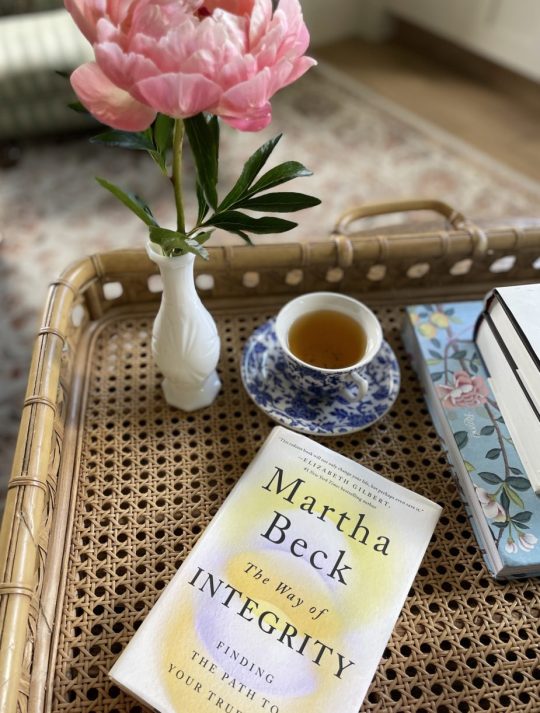
"Your life will tell you the truth." —Martha Beck, author of The Way of Integrity: Finding the Path to Your True Self
Divided. Compartmentalized. Unable to give what is needed, not by choice, but by pure, sincere inability due to time and energy.
Martha Beck explains in her new book, The Way of Integrity, the word integrity originates from the Latin integer meaning "in tact" and therefore cementing the definition of integrity as "to be one thing, whole and undivided".
When we are not living a life of integrity, we are not being true to ourselves, nor the world. Now you might be thinking about the general and more commonly known definition of integrity - living by your 'values' or abiding by the morals society applauds of, but that is not what Beck writes about in her book. Instead, Beck looks at the true meaning of the word and applies it to each of us individually - a life of integrity is a one when you have aligned your body, mind, heart and soul - your actions, your mental strength, your true self - you set yourself free. In the introduction she uses a phrase commonly known on this blog/podcast - you achieve a sustainable joie de vivre. "You may not believe that such a fulfilling life is possible. It is," Beck states with calm, assured confidence and goes on throughout the rest of the book, speaking from her own incredibly challenging and terrifying and finally liberating life journey, indeed what she shares is true.
"No matter how far you think you've strayed from your true path, the moment you say I'm going to trust myself, I'm going to follow my truth, the healing begins."
Beck's book crossed my path just after I had officially and publicly announced a resolve to live my own life of integrity as I had turned in my resignation papers concluding a 20-year career in teaching public education at the secondary level. I arrived at my decision after more than a few years of hemming and hawing about such a choice being necessary for me to live fully in alignment with what I knew to be true in my heart of hearts, and as I shared in my May episode of the video series A Cuppa Moments (learn more about becoming a TOP Tier subscriber and discover more intimately why I made this decision here), it wasn't about running away, it was about running toward something I loved even more.
Another way of looking at the way of integrity is much like putting together a puzzle. It can be especially hard to rationalize why we should leave something when on paper and to onlookers everything hums along beautifully, but if the puzzle doesn't allow your nature to be nurtured, as Beck describes, when you are "rushing to conform . . . often ignoring or overruling [y]our genuine feelings—even intense one, like longing or anguish—to please your culture . . . you've divided yourself. [You] aren't in integrity (one thing) but in duplicity (two things)." In other words, the puzzle isn't your puzzle to be a part of. Having the courage to step away from something that works, even if we languish while others shine is not living a life of integrity.
"When you pursue a career that pulls you away from your true self, your talent and enthusiasm will quit on you like a bored intern."
The question we each need to ask ourselves is "Does the culture nurture your nature?" Pause for a second before answering because I would have answered yes a couple of years ago, but upon reflection, with more truths revealed, and after reading her book, my answer whilst trying to teach and write, is most certainly no.
How do you know if you are out of your integrity?
1."Your life goes pear-shaped"
Beck reveals how our inability to communicate civilly, snapping at people we love, letting ourselves be distracted regularly by rabbit holes on the internet, and on the health side - your "immune system and muscles becomes weaken . . . emotionally feeling grumpy, sad or numb." Focus and clarity — difficult to maintained, sickness is more frequent and energy is depleted. All of these 'symptons' are red flags your life is out of integrity.
Let's end this point on some good news: "Integrity is the cure to unhappiness. Period."
2. Living a life governed by the 'should's and 'supposed to' expectations
Living simply luxuriously, at its core is built upon questioning society, putting into practice critical thinking skills and thereby thinking well. When we think well, removing our biases and acknowledging the short-sightedness as well as true motivations of the culture we live in, we can think clearly and free ourselves from the pressures and guilt placed upon us to live a certain way. Even if 'your way' seems simple compared to significant societal differences such as announcing you are an atheist in a family full of devout believers of any one religious institutional faith, acknowledging your truth regarding your gender even if your family or friends cannot understand your truth, or standing up for a political issue which forces your family to confront their own long-held unconscious biases. Your way of integrity needs to be honored to set yourself free.
Beck writes in detail about her own breaking free from the 'should's when she speaks about her stepping away from Mormonism (receiving death threats for doing so), sharing with the world and her husband that she is gay, and choosing to keep her child who she knew to have Downs Syndrome (even though at the time, people she respected urged her to not to). In great emotional, yet step-by-step detail, she shares how she made it to the other side and because each decision was her truth, she set herself free. She stopped living the life she was 'supposed to' and stepped courageously into a life of integrity.
3. Emotional Struggles
"Whenever you lose your integrity, you'll feel your own unique brew of bad moods, depending on your personality . . . anxiety and depression [or] . . . free-floating hostility, itching to punch everyone in your office, familiy, zip code [or] . . . full-on panic attacks, especially during special occasions."
For me, leaving teaching felt culturally 'wrong'. What I mean by that is, teaching and being a teacher is held in high regard, as, in my bias, yet as much as it is to not be biased mind, it should be. So leaving a profession which society holds in esteem felt to already be making the 'wrong' decision. However, as Beck calls them, my 'wild beasts' of bad moods would arise in the weirdest of times. I knew something was not in alignment, but nearly all of my acquaintances, friends and even my mother, were or are teachers. So how do you have a conversation with them about leaving a profession they are already in and most sincerely love and have found their calling? In my case, you keep teaching.
4. Bad habits — can't break them
The bad habits could be an onslaught of a variety of behaviors ranging from less harmful to incredibly life destructive, but anything which does not constructively add to your life and the quality of your days is a bad habit. Whether financial expenditures, drinking or eating habits, relationship failure after failure because you refuse to have the ability to either see or change what needs to be addressed, such habits stay with us becase "when [you're] feeling fundamentally lost, afflicted by purposelessness, foul moods, and bad jobs, anything that stimulates the brain's pleasure centers can become an addiction."
I can thankfully say, I had a positive outlet for my lack of finding purpose in teaching: blogging which turned into podcasting, which turned into cooking, which became my pleasure and purpose and I am incredibly grateful I honored my curiosity to explore what this 'blogging thing' was all about way back in 2009. I don't think we all have to have horrible habits so much so it becomes painfully obvious to outsiders we are not on the right life path for true integrity, but what I appreciate about Beck's book is bringing to our attention habits which if we are being honest with ourselves, aren't helpful to living a life we sincerely love living, but we keep engaging in said habit because we need the pleasure, we need something to 'feel' good because so much doesn't and we don't know or don't have the courage yet to step off the path that isn't ours to walk upon.
How to return or begin to live a life of integrity?
1.Stop lying
"Here's the rub: if you stop lying, you'll eventually, inevitably violate the rules of a culture that matters to you."
Stop lying when responding casually to the question, "How are you doing?" Be comfortable with expressing your exuberance about the day or exhaustion. The passive, default way of living is not living and it's not the way of integrity. How we connect with others, truly connect, is to be honest. I find that our culture is more comfortable with complaining even though America strives to be happy at all times. It is as though we must not be 'too happy' lest someone either question what makes us happy or want our happiness, when the truth is, there is not a limited supply. However, most Americans are too exhausted to want to figure out their own unique way to happiness. Again, this is a push-back on culture, not the people living within the culture. Admittedly, yes, a culture is made up by people, but when we recognize we are complicit in any culture which doesn't wish for its people to find peace and contentment, we must question it. That is an exercise in critical thinking. And how we do that is by finding our own way of integrity and living it.
2. Knuckle down for the first step of changing your life - it will be hard
Be prepared, the first step, the first shift you make will be the most difficult and will feel impossible on your way to fully being your true self. But the good news is, it is 'steepest at the start'.
And in even better news, because you are stepping into your integrity, let that energy be your fuel. Just as it did for Dante (Beck's entire book parallels the journey of Dante through the levels of Hell in Dante's Inferno, Part I of The Divine Comedy) who because he wanted to be set free "so damn much" used that "intense wanting" to "propel him forward over terrain he doesn't believe he can cover."
3. Acknowledging and walking away from 'bad or disordered' love
"'Bad' or 'disordered' love emerges when people are well-meaning but mistaken—for example, when we feel loyal to people and ideas that don't match our inner truth."
So many of Beck's anecdotes are specific and clearly teach what she is introducing to readers. On this point she shares, "You might stop laughing at your coworker's crude jokes. You may come out as gay or trans. You may start posting things on social media that shock your loved ones. You may turn into some version of Rosa Parks, refusing to give up her bus seat to a white person." In sharing these examples, she reveals how quickly our lives will change when we step away from 'bad' love. And it happens quickly because while you've known for quite some time your truth, you haven't shared it with those who you've let keep 'loving' you in a way that serves their needs, but neglects yours.
4. Be prepared to contemplate returning to old ways (even if they weren't true to you)
Prior to deciding to leave teaching, I chose to regularly see my counselor, and I am grateful I did. On this point, she reminded me, after always checking in with me about how I was feeling about my decision (once I had decided I would write my resignation letter) that there will be mourning for the 'old misery'. In other words, the life you know and are leaving, you will at times - whether in your dreams or in different states where you are emotionally weak or exhausted (these times especially were when my doubts would arise) - seriously doubt the decision you are about to make. What is happening is natural, and it does subside in time as I can share now after having felt those moments of mourning for the known misery. "Studies in psychoneuroimmunology show that if we plunge too quickly into any major change, even a good one, our bodies and minds can't absorb the shock. We must give our psycholoigcal and physiological systems time to adjust."
How we give ourselves this time is where the phrase "mourning the known misery" comes from. And it is knowing that such a temporary state exists that we are able to better navigate through this time and into a life in which we are fully embracing our true nature. A few words from Beck on this subject,
"If you start honoring your true nature and find yourself missing your old culture, don't panic. Be kind to yourself. Allow yourself time and space to grieve. Confide in loved ones. If they don't understand, find a coach or therapist. But don't think that missing your old life means you should go back to it."
5. A life transformed for the better
"Whatever you do to heal the world, it will replace [bad health, habits, moods, etc. - what Beck refers to as 'dark wood of error symptoms'] with purpose, happiness, vitality, love, abundance, and fascination that specifically match your true nature."
Perhaps this all sounds too good to be true, but simply the fact that you are thinking that is the hope you have unconsciously, that you hope it can be true. That it can be possible.
Benefits of finding your way to integrity and living it daily
1. A life full of "meaning, enchantment and fascination"
The world needs what you uniquely can give to it. When we each find the courage to honor our nature especially when the culture doesn't nurture it, we step forward toward a life full of meaning and we as well become uplifted and enthralled with the awesome life we have the good fortune to live.
Beck points out that thankfully, 'nature doesn't give up without a fight', so if you are doubting that it is too late, that you've waited too long, no it's not and no you haven't. The mere fact that you are still contemplating, wishing, hoping, wondering is nature's strength of hanging on until you finally take action to courageously find your way of integrity.
2. Breath-taking moments are experienced beyond what the culture tells you is possible
"Obviously, no one will have taught you how to navigate such wonders. No worries. You'll learn fast. You were born for it."
If happiness, and based on having read this book, I think more deeply it fits the definition of contentment, if contentment is something you could buy in the store and be promised a life of awe, wonder, peace, would you buy it? What if I told you it was free? I have a feeling some would question it must be too good to be true, but that is our conditioning when it comes to believing in how possible living well is. We have been conditioned to believe happiness can only be pursued, not attained, AND that only so many people are capable of attaining it so we must hurry up and chase it down, ignoring the present and constantly live in the future. But that is errant thinking.
The ability to attain contentment for free is possible because it exists within us each already. Our true nature, our true selves, has always been with us. We now just need to let it speak. In other words, let ourselves speak honestly, truthfully, and the world begins to change for the better. Not only for each one of us who courageously takes this step, but for all of us, as we begin to see who each of us actually is, how diverse and awesome we actually are and how to think well without unconscious manipulation.
3. A stronger you both physically and emotionally
As you begin to step off the wrong path and onto your way of integrity, there will be push-back, but wonderfully, you will be more capable than you might have ever imagined because, "Even if the people around [you] raise merry hell, [you] find yourself coping—more than that, thriving—more easily than [you'd] imagined."
4. A more peaceful you
The truth about feeling drained, emotionally exhausted is not necessarily the environment's fault, but rather that we shouldn't be in that environment. We are needed some place else. Find that and find your peace.
5. A life of inner harmony
True contentment, as shared on TSLL many times previously, is capable of being experienced even during the most difficult of moments and heartbreaking days and events. Why? When you've found and know what inner harmony is, an alignment of your true self - body, mind, heart and soul - you tend to what you have control over and acknowledge what you don't. You are living a life of truth in your actions, words and thoughts, and you are strengthened knowing how to navigate forward well, modeling and, when applicable, and you are capable, nurturing those around you forward as well with kindness and compassion.
6. Find your people who 'get' you
"If you don't walk your true path, you don't find your true people."
Ah, while I have met so many amazing people during my years as a teacher whether the staff and colleagues I have been incredibly fortunate and privileged to work alongside, the many, many parents who's love and tireless efforts to raise children in a world that is ever-changing, and especially the awesome students who through their natural strengths and honed skills, learning from struggles and finding truths along the way, my connection has been professional as I kept, for the most part, my writing life compartmentalized from my teaching life.
Once I finally began talking about what I love about blogging, which was only this spring (except to one, maybe two people over the years), a burden on my shoulders was lifted and I felt free. Some don't understand what I am stepping fully into and our relationships, even though respectfully colleagial, have lessened, but to others, we've had even more honest conversations than we have ever had. And this is just the beginning.
"We simply can't chart a course to happiness by linking up with others who are as lost as we are. The path to true love—true anything—is the way of integrity."
In order to fully and deeply connect with others we must be our true selves - no holding back, no editing, no 'hoping they like us'. When we are our true selves, it doesn't matter if everyone gets us so long as we let ourselves be set free, and that is what draws others of similar understanding and those who can see our honest and raw expression and who appreciate such strength will be drawn to, and those are the people you want to connect with. Those are the people with whom healthy, loving relationships spring from.
7. Balance
Yes, balance is possible (although our culture would have us believe otherwise, believing it is a skill to master, being constantly thrown from side to side, stressor to next stressor - don't buy into this myth!). In The Divine Comedy, Virgil writes something that 'stuns Dante. All these 'sins' are actually based in love. Sloth, greed, gluttony, and lust are simply unbalanced relationships with rest, abundance, nourishment and sex. We can err by either compulsively indulging or rigidly repressing our natural relationship with these things. This lack of balance doesn't come when we allow union with our true nature, but when we split ourselves away from it. It's misguided thinking, not natural behavior, that causes us to stray from our innocence."
Our innocence is our true selves. Our true self is found and experienced when we step into the way of integrity. Bravely doing so, courageously striding, becoming ever more stronger and exhilarated with each step.
8. Fulfill your long-term heart's desires
For this last point in today's post/episode, I'll leave you with Beck's words as she reflects on her own life journey and teaches us one of the grandest benefits of finding your own way of integrity, embracing your true self:
"As this internal shift occurred, life seemed to deliver more and more of the things I'd longed for during my life. I began to imagine that the universe works like this: whenever we humans long for something, the Powers That Be immediately send it. But everything we've ordered is always delivered to our real home address: peace. This is why we struggle for things in a state of desperation, they don't come to us—nothing works when it's misaligned. But when we return to a state of peace, the things we've 'ordered' can finally reach us."
— Martha Beck, The Way of Integrity: Finding the Path to Your True Self (2021)
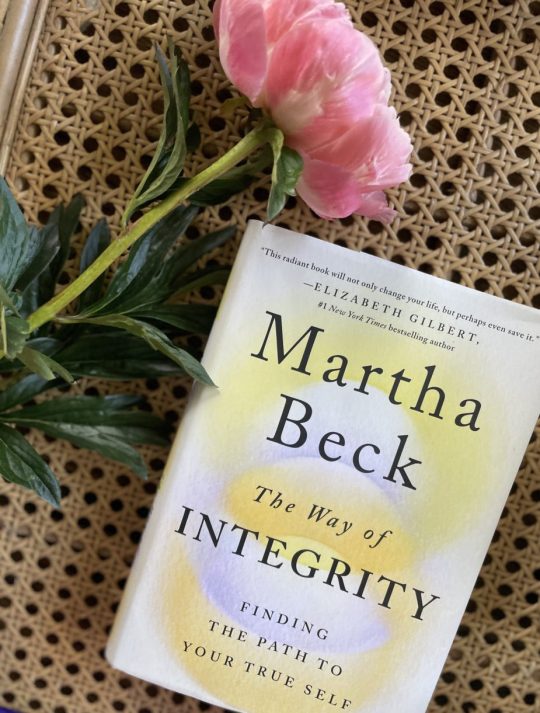
The way of integrity is a path through and with life that makes you excited simply to envision it for a moment. You may breathe a sigh of relief and a smile creeps upon your face spontaneously each time you dare to think what you imagine could be your real life. I have been so incredibly excited to share today's episode with you because while my last day of teaching doesn't occur for another two weeks, the announcement has been made, the reality has been put into place, and a peace not-yet-known-until-now is already being felt (yes, moments of mourning the known misery creep up, but they are fewer and fewer, and now I know immediately where they stem from and how to navigate respectfully through these feelings).
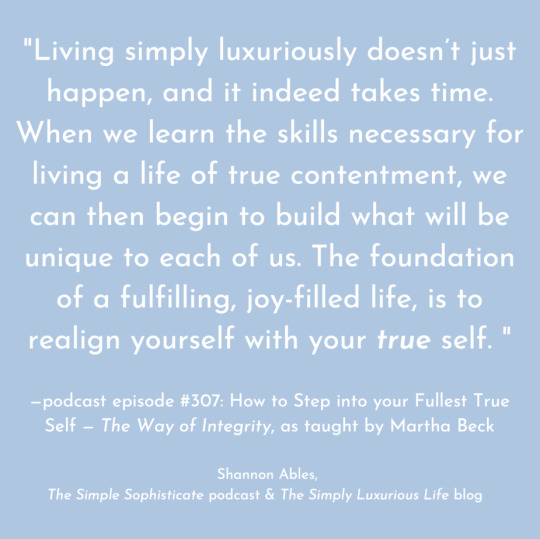
Living simply luxuriously doesn't just happen and it indeed takes time. When we learn the skills necessary for living a life of true contentment, we can then begin to build what will be unique to each of us. The foundation of a fulfilling, joy-filled life, is to realign yourself with your true self. To conclude with more sagacity from Martha Beck on making our way to integrity, "Not because this path is virtuous, but because it aligns you with reality, with truth. Your life will work for the same reason a well-built plane will fly. Not a reward for good behavior. Just physics." Logical and simultaneously honoring the full humanity of each and every one of us.
SHOP Martha Beck's book The Way of Integrity | Amazon | Bookshop.org
PETIT PLAISIR
~Lupin, on Netflix
~Learn more about this episode's Petit Plaisir on this specially dedicated post.
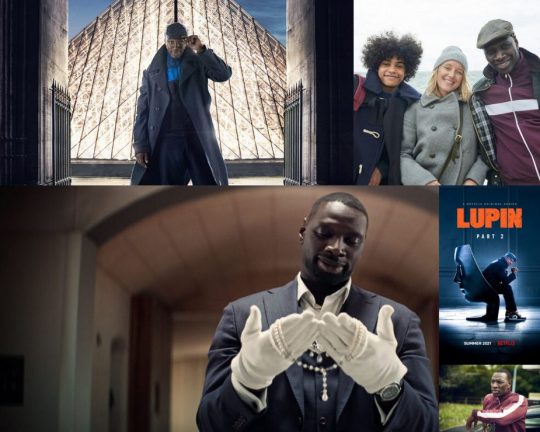
PART ONE, Trailer (season 1)
https://youtu.be/Y3tVDKuORi8
PART ONE, Trailer (season 1)
https://youtu.be/53cCYOIOEQc
~The Simple Sophisticate, episode #307
~Subscribe to The Simple Sophisticate: iTunes | Stitcher | iHeartRadio | YouTube | Spotify
Tune in to the latest episode of The Simple Sophisticate podcast
2 notes
·
View notes
Text
I find it... interesting that Resident Evil 8, subtitled Village, is the first to introduce vampires and werewolves to the series. Up until that point, the series had always been about biological weapons, mainly of the viral kind. As a Dracula fan, I immediately pledged myself to catch all the way up on the series in anticipation for VIII after seeing the announcement trailer in June 2020. I basically didn’t know anything about the series, as I was too young for M-rated games during its heyday (at least by my parents’ standards) and had no older cousins or siblings who’d introduce me. I didn’t even make the pandemic connection at first. All I was thinking of was how my new PS4, bought with the money I’d originally saved to go see my mom in Tennessee one last time, was slowly becoming my new favorite thing. It’d gotten my roommate through April with The Last of Us Remastered and it got me through May with Horizon: Zero Dawn. If I’m gonna make the switch from Nintendo to Sony, I may as well get to know Resident Evil starting in June.
The pandemic parallels came in much later. I’m playing them in release order, and it’s not until the second game that the characters have the time and awareness to consider synthesizing a vaccine. The characters in the first game have to figure out what’s going on as it’s happening to them, and it’s important to remember that zombies came back into popularity due to the efforts of that first game, meaning the exact nature of the threat would have come off more ambiguous at the time. The game’s Japanese title, Biohazard, holds the clue: we’ve scarred an ecosystem, and the human damage may be beyond repair. All you can do is try to save all the people who don’t deserve to be there as it happens.
Starting in the second game, I'd hear the characters talk about vaccines. I myself will reach full vaccination status tomorrow afternoon, and here I am playing games with characters who’ve killed just to get close to making one. The difference between our viruses in theirs is that we actually have some hope of curing ours, as in the world of Resident Evil, everything seems unstoppable. Momentum never seems to end once it’s been picked up - not for the virus, not for the destruction, and certainly not for human greed. The player is supposed to survive and nothing more, not live and thrive but to continuously struggle, lose, and sacrifice as they make their way through an environment that is either mastered or deadly to the touch. “Don’t get too close,” the special operatives say to their fellow agents. Resident Evil offers the power fantasy of knowing how to handle something impossible through trial and error. The horror is overcome by learning to live with it.
At least that’s how the first three games work. Starting with the fourth, all the atmosphere, pacing, and level design keep their levels of quality, but instead serve a much more direct fantasy of power in the form of a dread thriller with a pint of action thrown in for good measure. It’s clear that our relationship with the environment had changed by the time it was released. RE4 became the blueprint for third-person shooters, but funnily enough, going back to it reveals that it’s everything around the shooter that allows the main mechanic to shine that deep into the spotlight. The characters, for instance: Leon, now a professional, is infected with the game’s new virus himself early on, and he begins to have nightmares about what it might be doing to his body. If you’ve just come off playing through Leon’s first day as a cop in RE2, this is terrifying. He is practically a special agent at this point, meaning he’s accomplished quite a lot since the last game, so his plot armor can’t exactly be thick. Are we gonna see a character in Resident Evil, a game requiring a lot of death at first, actually die in canon?
More importantly: what does he do now that he has the virus? Is he gonna be okay? Am I hitting myself too close to home? Or is this the only piece of media that feels relevant to me anymore?
Resident Evil 5 takes place in Africa, and despite semiplausible claims of racism actually ends up being a staunchly anti-colonial parable about overcoming a world of fear. Chris Redfield finally lets go of fear when he looks over at Jill Valentine and Sheva Alomar, the two women who have now saved his life too many times to count. RE5 was built for co-op play, and its story is based around the vulnerability and necessity of partnership. It’s not defeating the big bad in a giant volcano that helps Chris live uninhibited. It’s his support network, however small it may be. (There’s even a woman of color in it). The characters of RE have always been at the forefront of the experience, but 5 at least tries to make it clear that there really are people worth fighting for out there, and ten times out of ten, you can spot them as the ones who’re fighting right there with you.
RE6 picks up on this theme of connection, gets high on nostalgia, and plays fast and loose with tone in a sort of victory lap. I’m not finished with it but it isn’t great so far. I also haven’t touched RE7, Code: Veronica, or Zero, as I want to finish those last two spinoffs before I move on to another phase of the mainline titles. And all the while, all my gaming channels are covering RE:Village without really covering it at all. I know that Capcom is bound to have some scientific explanation as to why vampires and werewolves made their debut in the series with this game, as it’d been in development for three years prior to its announcement, an echo of the past finally heard. But still, even if we’re grading on a curve, context is context. How wild is it that a year and change after the pandemic began, a game series known for its bio-weapons turns a gothic corner and drops its original moniker? Indeed, RE:Village is also the first not to have “biohazard” on any release title anywhere, regardless of region. In truth, I can’t quite blame the publications - I wouldn’t have noticed if I didn’t sit down to write this tonight.
Would I have boarded that hype train in June if the game had kept its chemical warfare? The Last of Us: Part II, another franchise brought to me by Sony, also had its virus and pandemic in the foreground, and that’s a top ten game for me now given my specific experience with it. But then, Resident Evil is special. The beautifully detailed graphics, endearing character moments, atmospheric pacing, motivated sound design, and confrontational control schemes have all made it stand apart to me as a series. I really have no comparison for how these games have challenged me and made me feel during this time. I’ve watched Chris become a soldier, Claire become a mother, Leon become a hero, and Jill come back from the brink, all while underneath the heavy horrors of a natural environment turned unstoppably hostile. One way or another, I’m glad I met them.
This was the year everything in my life took off in directions that I could no longer follow or keep up with. I can’t describe to you how much I feel like I’ve lost, despite all the incredibly important personal work I have done behind the scenes. I realize now that there are some changes that simply can’t be stopped or unchanged, only survived, endured, and adapted to. It’s taught me that we hardly ever seek change - it seeks us, and we are offered the task to accept it or defend against it. There’s something that feels right about playing these games at this time, of that I’m sure. I find it interesting that, by the time I get to RE:Village, the franchise itself will have changed into something quite different. But with each new game I’ve crossed off my list, RE has earned more and more of my trust as a series that knows all too well how changes come and go. Hopefully I will change right along with it.
#Ross writes things#resident evil#a crooked line of growth is still proof that you're growing#isn't that what Darwin tried to say?
4 notes
·
View notes
Text
The Essential Dykes to Watch Out For, Alison Bechdel

Rating: Great Read Genre: Graphic Novel Representation: -Lesbian ensemble cast -Racially diverse ensemble cast Trigger warnings: Reclaimed D-slur, animal death, cheating, divorce, cancer, casual transphobia, biphobia, and ableism, difficult topics ranging from war to AIDS to 9/11. Note: Not YA; sexually explicit
If you’re familiar with Fun Home or Are You My Mother? you’ll know what I mean when I say that Dykes to Watch Out For is no entry level work - though Dykes to Watch Out For is difficult for different reasons. While Bechdel’s ruminations on her childhood, psyche, and sexuality require a decent amount of outside reading to be fully appreciated, Dykes to Watch Out For requires an equally rigorous knowledge of the political landscape of the past forty years.
But on the other hand, the more things change, the more they stay the same. The wars, elections, discourse, and protests are not so unfamiliar. If I had to pinpoint Dykes to Watch Out For’s continued importance to lesbians today in just one idea, it would be this: “Against the sweeping backdrop of history... everyday life pretty much continues” (371).

It’s not a major theme of the work, yet it is the shape of the final tapestry. Politics, discourse, trauma, and sickness make their ravages, and here we all are, much the same as we ever were 10, 20, 30 years ago: this pattern, far from intentional, emerges from the tide-like flow of 30 years of comics. But it’s why Dykes to Watch Out For is so special. And we have the privilege of going back to look into that reflection of the 80s, 90s, and 00s and recognize familiar features. The political scenery may be different (or, honestly, not so different) but has daily life changed much?

I first tried to read Dykes to Watch Out For as a curious high schooler, and my eyes glazed over. Without having absorbed enough recent history through cultural osmosis, nor having developed a taste for gray morality, I just didn’t get it. Two characters would have an argument on the page, both of them would make provocative points, and then Bechdel would refrain from telling her reader which was in the wrong. Neither character was a straw man; it almost felt like Bechdel was arguing with herself, trying to decide what was right - if there even was a right answer. I couldn’t wrap my mind around it, especially when the vocabulary and context were both tantalizingly out of reach.
Reading now, I found the once alien discourse all too familiar. The same exact discussions were being had in 1985 as are being hashed out on Twitter. One of a hundred examples is whether gay marriage is a buy-in to the privilege bestowed by heteronormativity. Bechdel asks if marriage is a patriarchal model that can be salvaged, but she doesn’t have an answer for you, just a prompt to chew on.
Another example is Bechdel’s discourse on the outliers of lesbian spheres: trans lesbians, trans men, genderqueer people, and bisexual lesbians (Would you believe that term is used in the text - and equally as contentiously?). These are conversations we are all very familiar with. However, this discourse is especially interesting in a work that took 30 years to write. The reader combs through 30 years of metamorphosis in just a handful of hours. Bechdel’s tongue-in-cheek “Whatever will they come up with next?” is printed in the same volume with genuine consternation on who is allowed to be a lesbian.
Trans women start as a punchline. But on most topics, Dykes to Watch Out For tends, eventually, to stop itself to re-evaluate. Thirty years later, one of the main characters IDs as genderqueer, finds herself meeting trans men and doing drag king shows, fights with her friends over their trans exclusivity, and in the end, ends up advocating for and co-parenting a teenage trans girl, who ends up a main character in her own right. It’s one of Bechdel’s firmer positions on right and wrong, although she doesn’t hesitate to mouth the opposite argument, too.
Plenty of sympathetic characters say transphobic things which just hang in the air, unaddressed. It’s maddening - but in sticking with the material, I got to see the characters who flubbed the pronouns and complained about gender confusion eventually get in line - changes which are not commented upon and happen so gradually in the thirty years over which the comic was written, that they mimic how change happens in real life. In our own lives, change may seem impossible, but then you blink, a decade has passed since you first came out, and half the homophobes have come around. Much the same for Dykes to Watch Out For, which is almost as much a memoir as Fun Home (albeit of Bechdel’s discourse rather than her life). I think every cisgender lesbian should read it - it’s a powerful antidote against TERFism, not because it lays down the law, but because it meets you where you are and gives you the chance to say your piece without ridicule, before taking you by the hand and showing you something kinder. If Dykes to Watch Out For has anything to teach us, it’s that hard lines in the sand make you look like a dick thirty years later. Take Sparrow’s story arc. Mo, Lois, and Ginger are thrown when their friend Sparrow starts dating a man. They say some rotten things about how betrayed they are, how they don’t know if they can trust Sparrow anymore, or her politics - but when they are overheard, the “discourse” suddenly becomes real. That’s their friend, and her feelings are hurt. What else can you do for your friend who has spent decades of her life as a lesbian, whose identity is culturally and socially interwoven with lesbianism, and who identifies as a bisexual lesbian - except love her?
A frequent lesson is that anyone can be reactionary - even the left-est of leftists. Years later, when Sparrow faces an accidental pregnancy, her friends overwhelmingly pressure her to keep the baby, not because of their politics, but because of their excitement - yet the impact, if not the intent, is anti-choice. It’s ideas like these being brought to the forefront that make Dykes to Watch Out For something special.
In her introduction to the book, Bechdel frets over both keeping up with the changing current of discourse (XVI)

...and her own role in shaping that discourse (XVII)

But her work speaks for itself: if we are to do right by one another, we must prioritize one another, not the rules. The same conversations will be had again, and again, and again, from 1983 until we all go blue in the face. We can’t control someone angrily shouting into the room (or Twitter timeline) “but WHAT about BISEXUAL LESBIANS?” and the chaos that follows - but we can accept that someone will shout it again in twenty years, and that the following chaos will be so nearly identical to the previous chaos as to challenge whether it is chaos at all, or just the universe putting on a matinee performance of the same old song and dance. Is it useful to put on your tap shoes and sing along? Or do you end up hurting the feelings of a genuine friend who just happens to be one of the outliers this time around?
Dykes to Watch Out For is thought-provoking (as you can see, my thoughts have been well and truly provoked), occasionally in poor taste, but mostly surprisingly sympathetic, both to its more marginalized characters, and to its wrong-doers - this comic doesn’t have any villains. The initial gag, that Bechdel would write a catalog of lesbians like a lepidopterist giving clinical attention to a series of specimens, works to her favor. There are no bad lesbians and good lesbians. At least, not essentially. This approach lends Dykes to Watch Out For more staying power than it might otherwise have had - it’s relatable. You know these people. You’ve had some of these arguments, and hurt each other’s feelings over them. Your friends live in the mildewy house that’s kept at 64 degrees in the winter, where you’re as likely to be walked in on in the bathroom as not, a home where everyone in the friend group feels free to stop by.
Here in the future, we have the immense privilege of watching how these parallel lives to ours play out. The Essential Dykes to Watch Out For may be a comic for a different generation, but Bechdel has given us something fascinating from both a history and literary perspective. She has put to paper a sprawling epic about lesbians growing from their twenties to their forties, getting married (or not), progressing their careers, having children, having PTA meetings, having affairs, and doing civil disobedience with their kids. Rarely do we see the map from here to there laid out so meticulously. I read this book voraciously, both the earlier chapters that relate to life as a new adult, and the later chapters, which serve as a window into what life was, and could be.
For more from Alison Bechdel, visit her Twitter here.
#the essential dykes to watch out for#alison bechdel#lesbian#great read#graphic novel#protagonist of color#not ya#reviews only
90 notes
·
View notes
Text
RWBY Recaps: “A New Approach”

A friend of mine has a van that she calls the Fun Bus. Oh that’s cute, I thought. I should chuck that into a recap sometime. “All aboard the RWBY Fun Bus!” Except my fun levels are ehhh right now, so how about we just don’t.
In fact, let’s be totally up front about things and get the major positives out of the way:
The animation this volume is absolutely stunning holy shit
I would once again die for James Ironwood. All hail the Hug King
Excellent introduction for Tyrian and Watts. I love feeling like the villains are actually dangerous again
The rest? I’ve got some things to say.
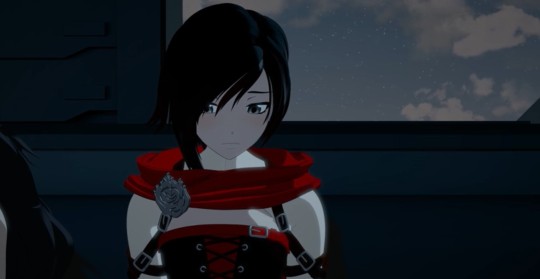
We open on Ruby looking appropriately downtrodden over their circumstances. Getting carted off in an Atlas police craft and all that. We get a pan across each side of the airship with the group looking angry (Yang) or defeated (everyone else)... with the exception of Nora, who is trying to eat through her bonds. I’m well aware that I’m nit-picking at this point, but for once I’d like the serious moments to remain serious in this show. Given her reaction to Salem, Kuroyuri, etc. we’re all well aware by now that Nora is more than just the comic relief. Undermining the others’ reactions with her making dog noises was an early cue that the writers weren’t going to treat the group’s arrest earnestly. To say nothing of the disservice it does to her character.
Actually, there were a lot of coincidental dog references in this scene. Nora’s growling. Referring to the Ace-Ops as Ironwood’s “personal attack dogs.” Deducing that he must have a “bone to pick” with them. Obviously this all means precisely nothing. What I want it to mean is that Zwei will arrive in another package courtesy of Tai, wondering how his kids are doing after one ran off and the other went to find her.
(Seriously though, does everyone remember Volume Five’s ending with Raven? Heaven only knows when that will become relevant again.)
While Nora continues to try and eat metal like a rabid animal, Jaune expresses disbelief that the Ace-Ops “took us out like it was nothing.” Honestly, it never ceases to amaze me how often the group is surprised by other people being stronger than them. Like they’re not the youngest and least trained in a world of professional huntsmen. Rather than acknowledging their need for improvement though---callback to Ruby’s “But we already know how to fight” anyone?---Weiss frames it as an exceptionalism intrinsic to her city. “Welcome to Atlas.” You know, the same city she quickly agreed to steal from and then draw the attention of the guards by giving a racist civilian what-for. The speed with which the show flip-flops between ‘We should fear this city’ and ‘But we shouldn’t take any actual precautions’ is pretty impressive.

All of which is made weirder by Weiss’ next line to the other prisoner locked up with them: “They’re not that big of a deal.” So... which is it, Weiss? Are the Ace-Ops Ironwood’s elites who can obviously take out a group of nine in seconds flat? Or are they worth scoffing and rolling your eyes at? Because you had a rather different opinion literally seconds ago. She does the same thing when the prisoner uses the term “tyranny” to describe the situation in Mantle. She claims now that the label is a “bit much” when before the whole group decided not to approach Ironwood precisely because of how tyrannical he appeared. I swear, good chunks of the dialogue just functions as openings for the plot---let the random prisoner explain all the horrors of this city!---rather than something the character in question would actually say.
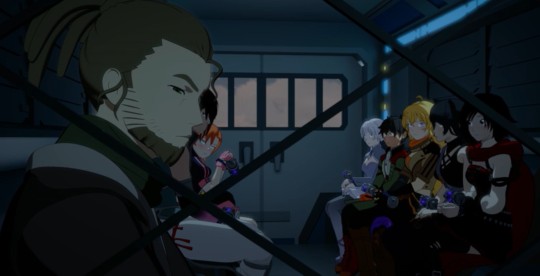
But I’m harping. We learn a bit more about Hill and her “Happy Huntresses,” clearly a parallel to Robin Hood and his band of Merry Men. I was actually surprised to learn that she’s a full-on freedom fighter, just based on her posters last episode. The number of them and their professional look felt more like Atlas’ brand of propaganda. Big brother sister is watching you and all that. Then again, we also learn that Hill is gunning for a seat on the council, so it sounds like she’s not an ally of Ironwood’s plotting betrayal, and not a radical entirely removed from him either. We’ll have to wait and see precisely where she falls in this divide between Atlas and Mantle.
That fight is treated rather cheaply by the writing though. In this episode at least. Despite providing numerous looks at how horrible things are for the citizens here, this prisoner, currently representing that fight against the elite, is depicted as an absolute buffoon. He’s not engaging in an important, glorious battle for human rights. He just chucked a brick at an airship. He’s over the top, overly passionate, crazed enough that the group is looking away as he desperately tries to convince the guards up front that these things are important. The thing is? He’s right. But the writing doesn’t encourage us to treat his cause with respect, not when he’s bouncing off the walls and yelling like a conspiracy theorist. Actually, that’s the best comparison I can think of here. It’s like if someone laying out 100% real issues with climate change were written like a crack-pot loner who believes in aliens. That’s this guy.
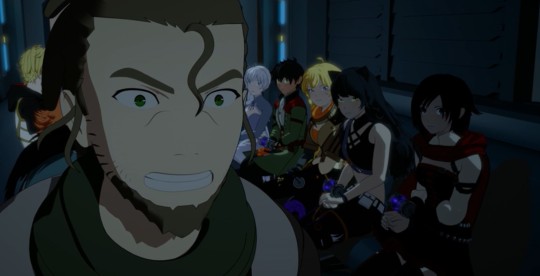
We’re shown again that literally everyone recognizes Weiss Schnee---does no one else in all of Remnant have white hair?---before Jaune and a few others get distracted by how pretty the view is outside. Qrow commented earlier that they were no doubt going to jail.
Spoiler! It’s not jail.
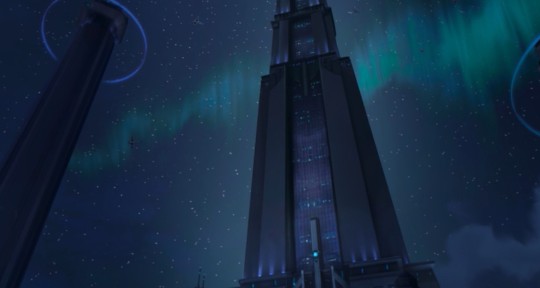
It’s Atlas Academy, animated in a truly stunning design that reminds me of Weiss’ trip to the CTV tower to contact her dad. Looking back, that skyscraper-esque building probably made her anxious for reasons outside of just the call.
“I guess we will be seeing the General,” Ruby says because yeah, why would we have the group experiencing one iota of punishment before being handed the solution to their current predicament?
Look, anyone who follows these recaps is well aware of my feelings towards the airship debacle. I said last week that I wanted the writing to treat the group’s horrific mistakes and criminal activities seriously, but I wasn’t overly hopeful. I was right not to be. From now until the conversation about Salem, the ‘protagonists can do no wrong’ mindset that drove Volume Six is pulled out again in full force.
First, Winter sees the group in handcuffs and responds with, “You have ten seconds to take those off before I start hurting you.” Which is completely out of character to me. Does Winter adore Weiss? Without a doubt. But Winter is also a stickler for protocol and rules. This is the women who threatened to remove Qrow’s tongue over a few vague, anti-Atlas statements. She is all about devotion to her Kingdom. So how should she react when she sees a group of kids being formally brought in for charges? I don’t know, maybe find out what’s going on before demanding an immediate release? Here, Winter prioritizes the emotional assumption that Weiss and her friends are perfectly innocent as opposed to trusting that they’re in handcuffs for a reason. Which they are. Combine that with the humor of the guards scrambling to obey her with more silly sound effects and it’s once again clear that the group’s arrest was never going to be taken seriously.
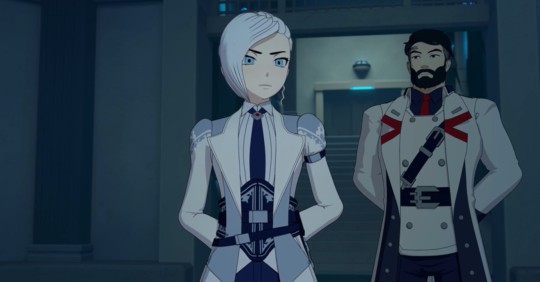
Things get so much worse though. Ironwood starts apologizing to them, also working under the assumption that this was all some sort of silly mistake. Of course you shouldn’t be in handcuffs. You’re the good guys! Yang and a few others have the gall to be haughty here (yeah, how dare you arrest us after we committed multiple crimes) and for a moment I think all of this will actually amount to something when Ironwood laughs and says, “We assumed [the ship] was stolen!”
Uh yeah, goes Ruby. It... was?

Which results in a brief moment of shock and about three seconds of anger from Winter... and then that’s it. That’s all we get. Weiss interrupts her with, “I’m sorry I worried you, but we did what we had to do” which, no?? Okay first off, worrying Winter is not the issue here. She’s been worried for literally those three seconds and nothing more. Second, as I’ve established numerous times in the past, they did not “do what they had to do.” Absolutely nothing in Argus forced their hand to the point where stealing military property, fighting Cordovin, drawing that grimm, and then deliberately hiding out from Atlas authorities was justified. Why doesn’t Winter or Ironwood challenge them on this? Why the hell would two military personnel accept at face value that committing all of these crimes was necessary? Imagine your younger sister steals a car (which is in no way comparable to an Atlas airship, but let’s run with it). She and her friends then get caught by the neighbor they stole it from, started a fight instead of giving it back, endangered a bunch of other people on the road, got the police involved, and hid out until they were finally arrested. Then at the police station big sister gets angry at the officers for daring to book you and is pacified with a hug. Don’t worry, dear. I know there’s no possible way you could be in the wrong here. No reason to acknowledge, let alone address, why you thought those were acceptable actions in the first place.

Qrow is briefly called out for letting this happen, but like Maria’s comment last episode about the group being incapable of keeping a low profile, he shrugs it off with a joke. “You try stopping these kids when they have their mind set on something.” You know what these ‘jokes’ remind me of? Privilege. Stuff like “Boys will be boys ¯\_(ツ)_/¯” where people accept that change is impossible, so why would we bother calling anyone out on their mistakes? Boys are just hardwired to hurt girls and call it love. Teens are just hardwired to steal airships and call it necessary. You know what they’re like. Putting your foot down is useless because that’s just how they naturally function... and we’re all going to ignore the fact that no one else could get away with this shit. They’re the special ones exempt from repercussions. There’s a reason why both both Oscar and Ruby smile here. They know they’re not in trouble.
What all of this boils down to is that the group is above both the law and basic decency. That’s what Cordovin, Ironwood, Winter, and the writing all tell us. It doesn’t matter how many people you endanger. What you steal. What you break in order to accomplish that. Or how long you might try to hide what you’ve done. You’re you, a nebulous acceptance that you’re somehow above everyone and everything. These kids are never going to learn anything because each time they make a mistake---even massive mistakes that put a whole city in danger---they’re rewarded with smiles and a blanket acceptance that they did what they had to do. That is beyond frustrating to me. For the love of god, let them face an actual consequence for once.
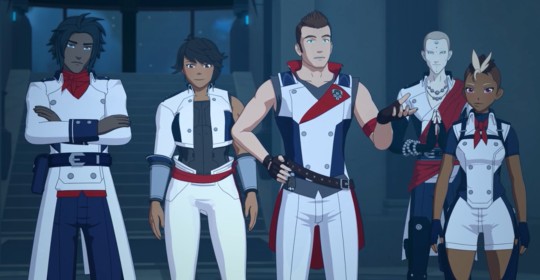
It’s not going to happen though. Even the Ace-Ops apologize for doing their job (and treat Ruby like some sort of celebrity in the process). RWBYJNRQO is painted as victims for suffering the indignity of arrest... when they did numerous things they should have been arrested for. I particularly love Weiss’, “You could have asked us some questions first.” Yes, because everyone should be in the habit of taking a criminal’s word at face value and then letting them go when they say, “I’m innocent.” Rather than acknowledging any of this, the writing has the Ace-Ops go out of their way to emphasize how special the group is. You’re kids, but only technically. You’re students, but who cares. You’re as good as us, regardless of training or qualifications. That fact remains that the group did in fact do everything they were accused of and more, something that should generate reflection on whether they’re up for being paired with professionals, rather than an insistence that they’re automatically on par with these adults who complete their missions in a legal, safe manner. If that Argus fight gets them hugs and cool new weaponry, I shudder to think what else the group can not only get away with, but be rewarded for.
Once everyone blindly bypasses one of the biggest conflicts of Volume Six, we hit on the other divisive choice this episode: Ruby lying to Ironwood about Ozpin and the relic.
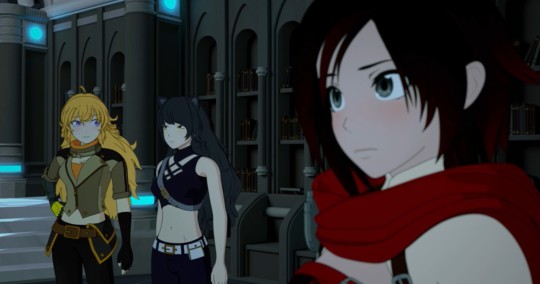
Okay. I’m going to be as clear as I can here: Ruby is being a massive hypocrite. That’s it. That’s the situation. I shouldn’t have been surprised by the fandom’s reaction, and yet I somehow still was. In just a few hours I’ve seen at least twenty posts detailing how Ruby is not a hypocrite because her situation is totally different from Ozpin’s. HE can’t keep secrets. SHE can. Which is the definition of hypocrisy: the group holding someone to a moral standard that they themselves will not strive for. Are there differences between telling the group about Salem and telling Ironwood about Salem? Yes, but the decision of whether or not to tell them derives from the exact same concerns:
Ozpin: I don’t know if I should tell these kids about Salem. I don’t know if I can fully trust them. I worry that admitting the relic still has questions will result in them using one irresponsibly.
Ruby: I don’t know if I should tell Ironwood about Salem. I don’t know if we can fully trust him. I worry that admitting the relic still has a question left will result in him using it irresponsibly.
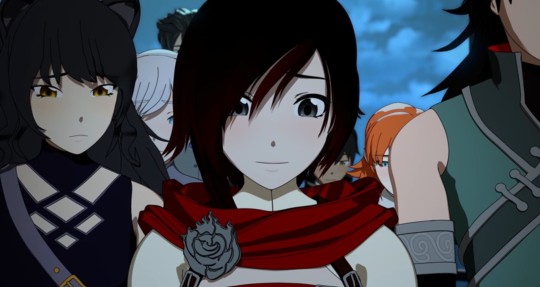
And everyone is in on it. During the elevator ride up they all want to know what Ruby will say, meaning that they’re ready and willing to lie the moment she decides that’s best. “We’ll follow your lead,” Blake says. No one pipes up with, “Hey. Why are we considering lying to Ironwood when we decided that there’s no moral justification for keeping secrets like that? Especially from an ally involved in this fight?” Except, the group obviously never decided that. Jaune was happy to keep his secret back at Beacon. Blake too. Yang is still withholding info about the Spring Maiden. They’re all perfectly happy to lie provided they’re the ones doing the lying. Someone else doing that to them though? Omg, how dare you.
That’s hypocrisy.
(As a side note: good lord this group is so astoundingly bad at fighting a strategic war. They announce that they should be careful about what they say to Ironwood while two of Ironwood’s guards are in the elevator with them. This is a needless conversation! No one has to establish that they’ll follow Ruby’s lead! But yes, let’s talk about our plans to withhold information from the General while two of his men are very obviously listening in. We even get a shot of one guard looking over at that little tid-bit. I wouldn’t be surprised if this came back to bite them in the form of:
Guard, who I am naming Brad: “Sir, I thought you should be aware... the prisoners that just left? I overheard them discussing whether or not they would tell you something.”
Ironwood: “What? But I thought we trusted one another... did they say what this something was?”
Brad: “No, sir. They just agreed to be careful about what they said in front of you. They clearly intended to hide something though.”
Ironwood. “Huh. Now that I think about it, Ruby did interrupt Oscar when he was about to say something. And she was awfully nervous about it.”
Brad: “Sounds suspicious, sir. I’d look into it.”
Ironwood: “Right you are, Brad. Thank you for bringing this to my attention. I’ll be sure you get a hefty bonus at the holiday party.”
Brad: “Thank you, sir! My husband and I appreciate it.”
Gay guards aside, this is why Ozpin was right to be cautious. This group is too hot-headed, too immature, and often too plain dense to keep world-shattering secrets safe. This moment gets put up alongside Yang’s demand that Ozpin spill all his top-secret info while the random old woman they picked up 30 seconds ago watches. They just don’t think.)

In short, they are in the same exact situation as Ozpin. Weighing truth against potential repercussions. The fact that said repercussions vary in severity---a group of teens betraying him and/or caving under the pressure vs. a potential dictator betraying them and/or caving under pressure---doesn’t matter. They’re both really bad potential outcomes and both parties are right to be cautious. So yes, I agree with Ruby’s hesitance. It’s the smart thing to do. What I don’t agree with is the characters’ and the fandom’s insistence that Ozpin is not likewise smart for doing the exact same thing. Now that Ruby has made this choice she’d better damn well acknowledge her own hypocrisy. If the writing doesn’t give us a serious moment in which the group reconsiders their actions against Ozpin in light of their recent choices, then the ‘protagonists can do no wrong’ mindset has irrevocably damaged this show. Because you can’t have Ruby making the exact same choices her mentor made and not change her perspective now that she’s had the chance to walk in his shoes. “Oh wow. Sometimes you do want to play information close to your chest. Maybe we were wrong to respond so viciously to Ozpin’s secrecy when I literally just did the exact same thing to someone else. I get it now.”
All that being said, I’d actually argue that Ironwood is in a more justified position to have that information. He’s a chosen member of Ozpin’s inner circle. Ozpin never got the chance to vet this group. He’s a fully fledged huntsmen in charge of an entire Kingdom. They’re a bunch of half-trained kids. Checking in on/taking the relic to Atlas does not require knowing about Salem’s immortality. Enacting a plan to tell the whole world about her really, really does.
Because what else is Ironwood’s end game here? The only way this plan makes any sense is if he believes that Salem is mortal. Ozpin may have failed to kill her, but if we get an entire world to attack her at once we’re bound to win! This plan straight up falls apart when you realize that defeating Salem is not a matter of more manpower. Salem’s immortality is the Achilles’ heel of this scheme, whereas fighting the good fight is something the group signed up for right from the start. Not that Ironwood’s plan is a great one, even if it were viable. I’m sorry, but plunging a whole world into despair---something that draws literal monsters out of the woodwork---is a pretty terrible idea. Ironwood’s army can’t be everywhere at once and an announcement of that proportion would cause an untold amount of death and destruction. I can sort of get Ironwood’s sacrificial perspective. Deal with the fallout because the end result (finally defeating Salem) will be worth it. “Trying to hide the truth from the world will eventually kill us all,” he says, except hiding the truth hasn’t limited humanity in the way he assumes it has. It has allowed humanity to live in peace while a select few try to figure out how to kill an immortal woman.
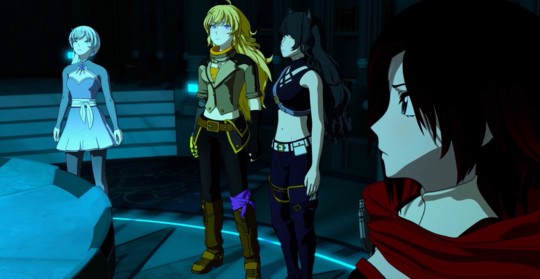
...speaking of, how has Ironwood not realized Salem immortality? This remains a basic if/then construction of the story that blows my mind whenever people fail to pass it. “If Ozpin has fought Salem for over a thousand years, then Salem is either immortal or reincarnating like he does.” Because nothing else is possible! I mean, maybe Ironwood does know about her immortality and he intends his plan to work for reasons I can’t fathom right now, but it’s looking really unlikely after this episode. It just astounds me that we haven’t had a single character go, “Of course she’s immortal. Why is that surprising to everyone?”
Anyway, I’ve gotten horrendously off topic plot-wise. We learn that Penny and Winter now know about the relics and Maidens---something that worries me a bit because, as a piece of technology, Penny is potentially hackable. Especially with Watts on the loose. The Ace-Ops know as well. We also learn that they’ve already found the Winter Maiden who, according to Qrow, is “not exactly a spring chicken.” Huh. Another important piece of information that wasn’t blithely announced because people naturally work on a need-to-know basis... Sorry. Not diving back into the salt. That comment does actually intrigue me though. We know the powers can only pass to young women, so it’s a cool setup to present us with someone who has actually survived with that power for most of her life. I’m also eager to know whether Winter is set up to be the next Maiden. “Young” is a subjective marker and one of the criticisms fans have leveled at Ozpin is the fact that he put that pressure on Pyrrha instead of asking an older, fully trained huntress to be the Fall Maiden. Making Winter the next Maiden will lend support to that criticism. Ozpin could have chosen someone older, an actual adult, and actively chose to give it to a teen. As opposed to the assumption I’ve always worked under: those like Glynda and Winter are now too old. We’ll have to see.

Outside of the Salem part of the plan, I think making Amity Arena into a satellite is an excellent idea. Provided grimm like the Nevermore really can’t reach it. It’s actually cool to see how our real life, kind of boring tech makes its way into a sci-fi/fantasy series.
And while all this stuff is getting revealed we see how utterly thrilled Ironwood is to have them all back. To be blunt: I adore this characterization. I want this to be real. Not only because it’s a breath of fresh air to have someone acting so loving and optimistic towards everyone---He acknowledges Ozpin’s existence! Look at that smile! Kneeling down!---but also because it would be an excellent subversion of the premier’s setup. Dictator-y military figures buckling under paranoia is out. Tired but loving military figures making mistakes they’re willing to fix is in. That hug with Qrow? It added ten years to my life. Tender moments between two stoic guys will carry me through these cold winter months.
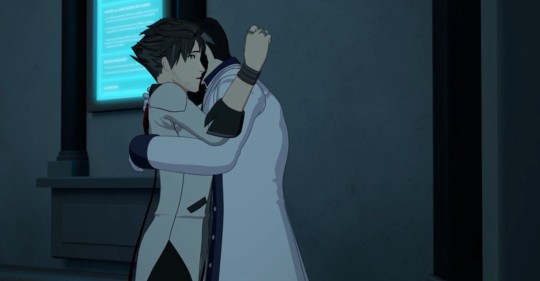
But (there’s always a “but”...) I’m not willing to buy into this characterization just yet. Not only because Ruby herself obviously isn’t ready to trust it. Not only because this is a story and we expect conflicts in the form of twists and surprises. Not even because there are moments where our trio feels vaguely threatening, stationed perfectly behind that desk, separated from the rest of the group.

No, I’m hesitating because this whole encounters feels... staged. Let’s review the series of events from Ironwood’s perspective:
You learn that one of your airships has been stolen
Instead of sending some everyday guards like the situation calls for, you send out your most elite group to take care of this issue
They immediately confiscate the relic, demonstrating a) that they know it’s important (they recognize it as a relic) while likewise b) not showing any surprise that one of the four, magical objects in the world just happened to turn up among these random teens
They bring the relic to you
Someone orders the pilots to bring RWBYJNRQO to Atlas Academy, not jail
You then act surprised when the group suddenly arrives

Which, under the circumstances, makes no sense to me. Even if Ironwood had no idea who stole the airship (I’d have expected Cordovin to have contacted him about the distinctive group heading his way...), he would have figured it out the moment the Ace-Ops walked in with a relic in their possession. Someone obviously gave the order for them to bypass jail and come straight to him. Basically, Ironwood is expecting them. Ironwood set up the arrest and everything attached to it. The surprise at their arrival, the fawning over their treatment, really over the top emphasis on trusting each other... This whole thing feels fishy to me considering that he had to have known it was all happening in the first place. It feels like a man crafting a situation where he can look approachable and kindly, arriving like a savior and endearing the group to him. Remember who got you out of those bonds? Huh? Huh? Even the choice to give Ruby the relic back. Do I need to point out how incredibly stupid that is? Ironwood isn’t stupid. He wouldn’t give an invaluable, magical object back to a 17yo unless he had another, good reason for doing so; unless the need to make Ruby and her followers blindly trust him outweighs the risk the relic is in while she carries it.
I mean... seriously. The entire point of coming to Atlas was to put the relic in a safe place. And then Ironwood decides that carrying it around on the streets is somehow better than locking it up in the vault? When Ruby and everyone else just got beat by the Ace-Ops in about five seconds flat? Someone could take the relic off them in a heartbeat! It doesn’t even need to be a main villain. Some stronger-than-average goons could manage it under the right circumstances and a bit of luck. Look at this bright, shiny thing we can sell for quick lien. No, I have to believe Ironwood has an ulterior motive here. As much as I want him to genuinely be what he presents himself as---the embodiment of our opening, “When we trust in love and open up our eyes”---a lot of this just doesn’t fit.
(Then again... it’s RWBY. And the writers are clearly still working with protagonist vision goggles. Maybe Ironwood really does think Ruby keeping the relic is the best option here. In which case he’s just a fool.)

All of which, notably, still keeps our group from tackling the core, ethical issue: why they want to fight Salem when they think it’s impossible. They’re ignoring that question by keeping the truth from Ironwood. The plot avoided them completing their mission by having them get the relic back. We’re just existing in perpetual limbo here.
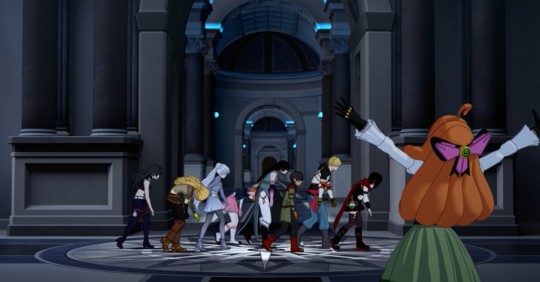
Which finally brings me to Penny. The end of this episode has her leading the group on an exhausting tour of Atlas Academy, the exact sort of bubbly, silly, casual interaction we got with her in the early volumes. Last week when I pointed out how inappropriate everyone’s reactions were to finding out a friend is back from the dead, a lot of people commented that we’d get to the emotional stuff later. Or going so far as to claim that the group, Ruby in particular, is suffering from a delayed reaction. Except we didn’t see that. There’s a difference between a setup and a non-evidence based assumption that what we want to watch will eventually end up on screen. There was no setup for a delayed reaction. No Ruby holding back tears. Or a closeup on someone grappling with an emotion. Or someone else trying to say something before they were cut off by the sirens. All of those imply that an emotion exists but, since we don’t have the time or the inclination to deal with it now, we’ll come back to it later. That wasn’t the case last week. Every emotion was clear and complete, no variation in regards to the overall chill acceptance of Penny’s resurrection. Now, we’ve seen that trend continue. Ruby doesn’t stop in shock when Penny appears in the Academy hall. We’re given no indication that anyone is distracted by her while discussing business, in the way one might be when a friend and ally is unexpectedly back in your life. When she’s left alone with them, there’s nothing except the montage of exhausted tourism and Ruby’s demands to know where they’re sleeping. Basically, I think this is it. Sure, maybe later down the line---maybe even next week---Ruby will have a heart-to-heart with Penny, but by that point it’ll be too late to feel emotionally fulfilling. We’ve already seen their first meeting, a surprise encounter, doing business, and hanging out together, none of which acknowledges her status as a miracle. Hell, in this episode at least, no one even cares that she knows about relics and Maidens now. Penny has never been closer to the group, but she’s still being treated primarily as the comic relief.

As @valasania-the-pale pointed out to me, we also have the question of when Penny was rebuilt. Doesn’t anyone, at the very least Ruby, care that their friend was brought back and no one thought to tell them about it? Would Ironwood, Pietro, and Penny herself have just let them live with her death indefinitely? It’s a pretty messed up situation when you think about it. A fantastic setup in my opinion, but one that Rooster Teeth isn’t equipped to handle well. Like with so much of RWBY, there’s great potential and very little follow-through.
At least Watts and Tyrian were introduced appropriately. We got confirmation that Watts helped build the Atlas code and now controls it at his whim, causing crashes and powering down security cameras. It’s the perfect threat for a city almost entirely reliant on its technology. Even down to, as said, an ally like Penny who knows all these secrets. Hell, Winter’s comment about the group having access to Atlas’ best weaponry while they’re here is worrisome. What if their upgrades end up hackable as well?
Tyrian, meanwhile, is still Tyrian. That blood pool was a great shot in my opinion. Wonderful creep factor as he sets off into the city. “I suppose we all have our talents” indeed.
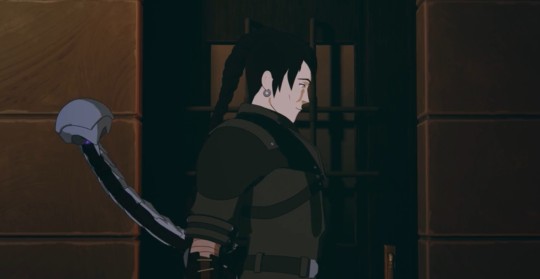
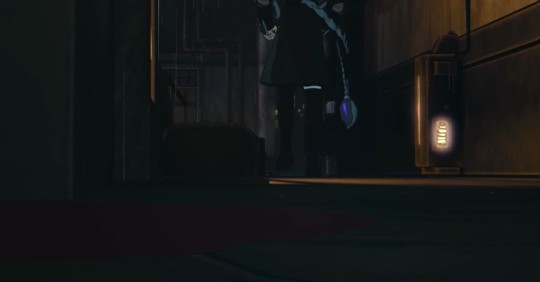
Obviously then, there’s a lot going on. A lot to cover and, on my end, continually dwindling hopes that RWBY will cover it well. I can’t be too excited about the group lying when we 100% bypassed their choices last volume. If the show isn’t willing to call them out on those mistakes, I doubt they’ll be willing to call them out on this one either. I’m preparing myself to watch precisely what we’re getting in the fandom right now: an insistence that Ruby is wonderful for keeping her secrets while further demonizing Ozpin for keeping his. Because that’s where we’ve been for the past fifteen episodes: perpetually insisting that everything the group does is, by default, heroic. Logic and hypocrisy aside.
But we’ll have to see.
Until next week 💜
Minor Things of Note
1. Please pay attention to precisely how many long, wide, and aerial shots we get throughout the episode. This is what happens when your main cast is made up of twelve people all working in the same place. Plus six more including Maria and the Ace-Ops. That’s far, far too many characters.


2. I really love how the Ace-Ops’ tail gives away how excited he is. That was adorable.
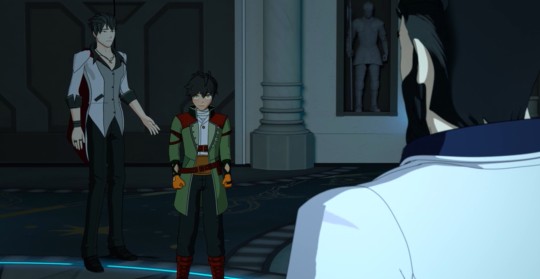
3. Despite my enjoyment at Ironwood’s obvious joy over seeing Ozpin... morally this is so fucked up for Oscar. He’s introduced by Qrow as, “the next Ozpin,” essentially undermining his identity as his own person (note how massively uncomfortable his body language is in this moment). Ironwood then immediately starts speaking to him as Ozpin, not at all interested in the kid he’s housed in. If he even understands that Oscar is a separate person. We should all keep in mind that just a few days ago Qrow told Oscar to stop thinking of himself as an individual. Ruby agreed with him via her silence. The whole group was happy-go-lucky when Oscar announced that he’s resigned himself to just disappearing someday. As happy as I am that someone actually acknowledged Ozpin’s existence and (gasp!) was happy to see him, Oscar is still getting the short straw in all this. The group really treats him like he’s some form of transportation and nothing more. Penny, our resident robot, has more agency than he does.
4. Maria is still just hanging out with Pietro, I guess? Does she care that the group got arrested? Is she trying to do anything about it? I’m half expecting a comedic moment where she barges in, prepared to break them out and take on all their captors... only to realize they never needed her help in the first place.
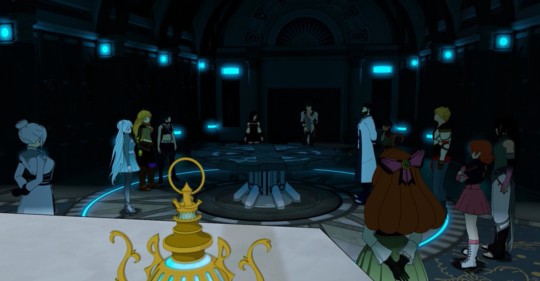
5. I like this shot of the relic, the first thing to be bathed in light when Ironwood’s presentation ends. Not convinced it means anything, but a cool perspective nonetheless.
6. Intrigued by this guy.
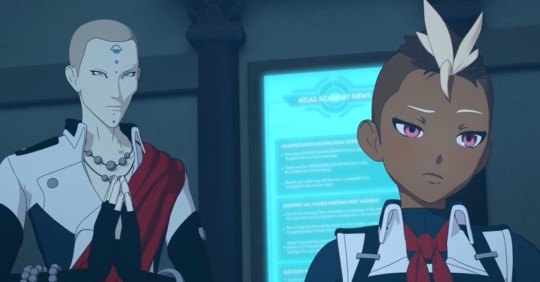
7. Love, love, love, love, love Watts’ purple outfit. I mean, I’m just a sucker for purple in general. So... yeah. There’s that.

70 notes
·
View notes
Text
Baby You Were My Picket Fence [Chapter 3: Light My Fire]

You are a first grade teacher in sunny Los Angeles, California. Ben Hardy is the father of your most challenging student. Things quickly get complicated in this unconventional love story.
Song inspiration: Miss Missing You by Fall Out Boy.
Chapter warnings: Language.
Link to chapter list (and all my writing) HERE
Taglist: @blushingwueen @queen-turtle-boiii @everybodyplaythegame @onceuponadetectivedemigod @luvborhap @sincereleygmg @stormtrprinstilettos @loveandbeloved29 @ohtheseboysilove @jennyggggrrr @vanitysfairr @bramblesforbreakfast @radiob-l-a-hblah @xox-talia-xox @killer-queen-xo
You open the front door and there he is: black button-up shirt, navy jeans, chic but not overdressed. His hair is neatly gelled back from his forehead. In his arms are a lug wrench, a car jack, and a brand new tire wrapped in an oversized, floppy red bow like a Christmas present.
“I think normal guys bring flowers,” you comment.
“I figured...since you’re automotively illiterate and all...you probably hadn’t gotten around to replacing the spare yet.” He shoots a glance at your Elantra, then announces victoriously: “I was right!”
“Mr. Hardy...Ben...I really can’t allow you to perform any more free labor.”
“Five minutes,” he calls over his shoulder as he trots to your car. He has trouble with one of the lug nuts, so it takes him six and a half.
“You can come inside,” you tell him once he’s finished. “I won’t be long, I just have to water my plants.”
Ben raises an eyebrow. It’s dark and rather undomesticated, yet endearing. “I feel like there must be better stalling tactics than that. If you’ve got cold feet, I can handle rejection.” But what he can’t do is disguise the way his shoulders slump, the way he bites the corner of his lower lip apprehensively.
“No, really, it’s totally stupid, but I’m really trying not to kill this batch and if I don’t water them now I’m going to be stressing about it until I get home, and I don’t want to be thinking about houseplants all night, I want to be thinking about...” You wave your hand towards Ben inarticulately. “You know. You.”
He smiles, showing his teeth, his eyes lit up like embers, flickering and radiant and warm. “Take your time, Martha Stewart.”
“My parents give me so much hell for this,” you call back to him as you flutter around the living room, standing on your tiptoes and reaching around furniture to water your peace lilies and spider plants and devil’s ivy and one wilting ponytail palm. “They’re farmers. They’re professional life-givers. I’m lucky if I can keep the cactuses alive.”
You hear Ben rambling around the kitchen. “I hope your nurturing skills are at least marginally better with first graders.”
You laugh, nodding even though he can’t see you. “I’m alright with those. I’m just more of a rock person than a plant person. Gems and minerals and volcanic glass...fossils and bones and teeth...that’s where the magic is for me.”
“I can see that. Dinosaurs are well-represented in your extensive fridge magnet collection.” There are clicks and scrapes as he rearranges them: prehistoric animals and tiny planets, peace signs and alphabet letters and cross-sections of agate. “These are so cool!” he exclaims.
You bustle back into the kitchen, place your watering can in the sink, and wipe your hands with a dishtowel patterned with cartoon brontosauruses. “Ready?” Your eyes flick to the refrigerator. He’s organized your magnets into a giant smiley face. It’s ridiculous, it’s juvenile; but you feel this liberatingly simple joy flooding through you like early autumn air. And the way Ben’s grinning at you—a little mischievous, a little proud—reminds you so much of Eli that your breath catches in your throat. You have no idea who Eli’s mother was, but her genetics were omnipotent; it’s almost impossible to find any of Ben in him at all. But every once in a while there’s an unconscious gesture, an off-kilter smile, and suddenly you can see the common threads that wove them into being like spiders’ webs.
“Ready,” Ben agrees.
You smooth your dress as you slip into the passenger’s seat of his Lexus, placing your purse between your feet, checking your hair and makeup in the sun visor mirror. Ben glances over at you as he shifts the car into reverse and roars out of your driveway. Your hands aren’t shaking, your heartbeat is hushed, there’s no hot rushing blood in your cheeks or ears; this shocks you. It’s eerie how inexplicably at ease you are.
“Find something good,” he says, pointing to the radio.
You seize the dial. “Uh oh. My first test?”
He smiles, his eyes on the road now. “Choose something lame and I abandon you at the nearest sketchy-looking gas station.”
You flip through stations until you find Somebody To Love. “I work hard, every day of my life, I work ‘til I ache in my bones...” “Okay, how I’d do?”
Ben steals a suspicious peek over at you. “Are you fucking with me?”
“What?” you ask, bewildered. “No, why?”
He shakes his head. “Never mind. You definitely pass. You’re a Queen person?”
“Oh yeah, absolutely, I adore Queen. Most classic rock, actually.”
“So have you, uh...” He touches his chin thoughtfully, what you’re quickly realizing is a little nervous tic. It’s cute as hell. Goddammit, daddy demon, stop being so fucking perfect. “Did you ever see Bohemian Rhapsody?” But something gives you the impression he already knows you haven’t.
“Not yet,” you confess.
“Not interested?”
“It’s not that, I just...” You hesitate, trying to put it into words. “I know it did well and all. But I guess I’m skeptical of anyone trying to play Freddie Mercury. He was a legend, he was one of a kind. So are the rest of them. Those are massive shoes to fill. It seems like setting the actors up to pale in comparison.”
“I’ve heard it was pretty good,” Ben presses, almost teases.
“Yeah, maybe...”
“And Rami won the Oscar. So his portrayal must have been satisfactory.”
“Okay, oh my god, I’ll see it, are you happy now? Were you on the marketing team or what?”
You’re only half-serious, but Ben chuckles evasively. “So you like old rocks and old music,” he pivots. “But not old not-boyfriends. Except Jeff Goldblum.”
“This is news to me. I sincerely thought you were sixty.”
He laughs, a full gutsy laugh this time, a laugh that says he’s caught-off guard and thrilled about it. “That’s okay. I’m into old stuff too.”
“Yeah?”
“Yeah. Old music, classic rock, just like you. But old books too.”
“Gatsby?”
His eyebrows leap up; you’re watching his face as streetlamps illuminate the car in reiterating flashes like a spinning pulsar. God, he’s beautiful. “How’d you guess that?”
“Eli’s middle name is Fitzgerald. That’s not a common one.”
“Ah,” Ben says, and his full lips turn up at the edges into a smile, proudly, fondly.
“I really like it.” That’s the truth; Eli’s a handful and that’s a titanic understatement—though he has been better the last few days, the only blip on the upward trend being his attempt to convince Brayden to eat a live cricket by paying him in Oreos—but his name is classic and elegant and a few literary references here and there never hurt anyone.
“Yeah, that was me,” Ben reveals. “His mother insisted on choosing his first name, I think she heard Eli somewhere and just liked the sound of it. But she let me pick the middle name. And The Great Gatsby was always my favorite book...and The Beautiful and the Damned, and This Side of Paradise?! Freaking incredible. In my humble opinion F. Scott Fitzgerald is a certifiable genius. So...Eli Fitzgerald.” There’s a color in his voice you can’t quite read: the golden yellow of reminiscence, the murky blue of loss, the grey nothingness of depression, the bloody maroon of deep pain or resentment. Who was she, Ben? How did she hurt you? And could I ever fill those hollow places you’re carrying around like pocket change?
He asks how Eli is doing in class, and you tell him; you ask about his favorite classic rock bands, and he answers: Boston and AC/DC and The Stones and Queen. His Lexus cruises by your go-to dinner spots—the affordable chains like Noodles and Co. and Panera and Chipotle—then past the mid-level raw vegan and farm-to-table joints, and finally into the neighborhood reserved for fine dining establishments with three-figure price tags and reservations booked up months in advance.
“Uh...” you begin. “I don’t think we’re going to get a spot at a place down here.”
“Think again.” He parallel parks with absurd ease in front of an Italian-Japanese fusion restaurant called Nejire. There’s a line of people in suits and evening gowns waiting at the door. You feel like a minnow in a shark tank.
“Ben...”
He comes around to your side of the car, opens the door, and holds out his hand. “You trust me?”
Do I? You take his hand in yours like a life raft. “Don’t let me down, Mr. Hardy.”
Unpredictably, fantastically, he brings your knuckles to his lips. “You got it.”
He spirits you inside, past the line of waiting customers, past the hostess and waitresses; they glimpse up and nod at Ben as he draws you through the main dining room and back to a VIP table in a dimly-lit, quiet corner of the restaurant. Oh, you realize with awe and trepidation. He’s an important guy.
You take your seat and open a menu as waitresses array full glasses of water and wine across the table. There’s nothing under fifty dollars. You flip to the salad page, searching desperately.
“What are you doing?” Ben asks gently.
“Um, nothing, just browsing...”
“You’re not paying for any of this,” he says point-blankly.
“That’s not very feminist of you,” you quip, but on the inside you’re sinking. This is too much, this is way too much. I can’t let him do this for me.
“I’ll explain later. Trust me, we’re good. Order something expensive or I’ll do it for you.”
“I’m a teacher, Ben. My idea of luxury is Olive Garden.”
He grins at you boldly, almost roguishly. “Oh we are going to have so much fun together, Miss Y/L/N.”
Orders are placed, wine is sipped, appetizers are ferried to the table. As you nibble on ahi tuna tartare and caprese sushi, you find yourself lost in how Ben motions wildly with his hands as he tells stories, how his large emerald-or-jade-or-malachite eyes gleam when he’s animated, how his voice is so rich and deep and yet mild, how it suddenly feels like you’ve known him your entire life. Oh no. Oh no, I like this guy a LOT.
Ben abruptly stops eating and cracks his knuckles. “So there’s something I need to tell you. Since we’re...” Air quotes. “Not dating.”
Oh fuck. He’s married or something. “Okay. I’m listening.”
“It’s about my job.”
Whew. “Ah yes, your elusive profession. You can tell me the truth if you’re a dogwalker or a circus clown or something. It’s always nice to out-earn someone. Actually, dogwalkers in L.A. probably make more than me...”
“I’m an actor.”
“Oh,” you reply cautiously. “Like, for tv shows or independent films?”
“No,” he says, amused. “For major films.”
I knew he was too fucking gorgeous to be a normal person. What am I doing here? “Like what?”
“Well, recently, Bohemian Rhapsody.”
You choke on the white wine you’re drinking and cough and gasp into your cloth napkin.
“You okay?” Ben asks. “Don’t die. You can’t die yet. You haven’t tried their tempura crème brûlée.”
“You...” You cough once more. “You were in the movie that made $900 million dollars...?”
He grins toothily. “So you were keeping up with it!”
“It was hard to miss that tidbit. It was all over the news. BoRhap won the Golden Globe.” Your head is spinning. “You’re an actor,” you repeat.
“I played Roger Taylor.” The brilliant, obscenely good-looking drummer, the man who wrote Radio Ga Ga and These Are The Days Of Our Lives and A Kind Of Magic.
“Oh my god, Ben!”
“I mean, I’ve been in other things too—”
“Ben!”
“Look, relax, we’re cool. I’m not telling you this to freak you out, I’m just explaining that you don’t have to worry about dropping a few hundred bucks at dinner. You have a right to know who I am if we’re going to be...involved. And there’s something else.” He wrings his hands. “I have to be...discrete about my personal life. Try to stay under the radar.” But now that effortless comfort is strained somehow, weighted, ominous; Ben averts his eyes. There’s a presence in the room like a storm cloud, trapped pulsing lightening igniting the opacity from within.
“Sure,” you say, thinking that a life in the spotlight can’t always be easy. “Lowkey. I got it.”
“Awesome.” He’s relieved.
“I have to keep it on the down-low too. I’m a pretty important person myself. A bunch of six-year-olds would lose their minds if they knew about my extracurricular activities. They would color such scandalous pictures in art class. Premarital dinner dates, maybe even handholding. Yikes.”
That makes Ben chuckle; the shadow is nearly lifted. “Keep drinking, Miss Y/L/N. I’m loving this.”
And it should feel weird or frightening or wrong that he’s using the word love this soon, this casually; but it doesn’t at all. It feels anything but wrong.
~~~~~~~~~~
Your feet are on your kitchen floor, your palms empty. Ben’s fidgeting around, his hands in and out of his jean pockets; it seems like he’s trying to say goodbye, but maybe he’s not.
“So...” he ventures.
You wonder if he’ll touch you, if he’ll kiss you. You try to catch his eyes, but they’re everywhere except meeting yours. “Hold that thought.”
You dash down the hall to your bathroom to smooth your hair, touch up your makeup, swish some Listerine. On the way back to the kitchen, you stop in the living room to check on your plants. If it’s possible, they look a little perkier than they did when you left a few hours ago. You run your fingertips over the broad leaves of your peace lilies, smiling faintly to yourself. “Maybe we’re going to make it after all,” you whisper.
You hear the distinct clicking sound of iPhone texting. “Oh shit,” Ben mutters from the kitchen. “I’m sorry, I gotta go, Y/N, okay? I gotta run. But I’ll call you. I’ll see you soon.”
“Okay, just a sec...” But by the time you rush into the kitchen to say goodbye, Ben is gone, the screen door swinging forlornly. Puzzled, you lock the door behind him as headlights flare to life in the driveway and swiftly retreat into the night. Then you turn around.
Your fridge magnets are rearranged again, this time in the shape of a heart.
270 notes
·
View notes